Rechercher dans ce blog
Sunday, March 31, 2019
Israel, Hamas Cease-Fire Appears to Be Holding
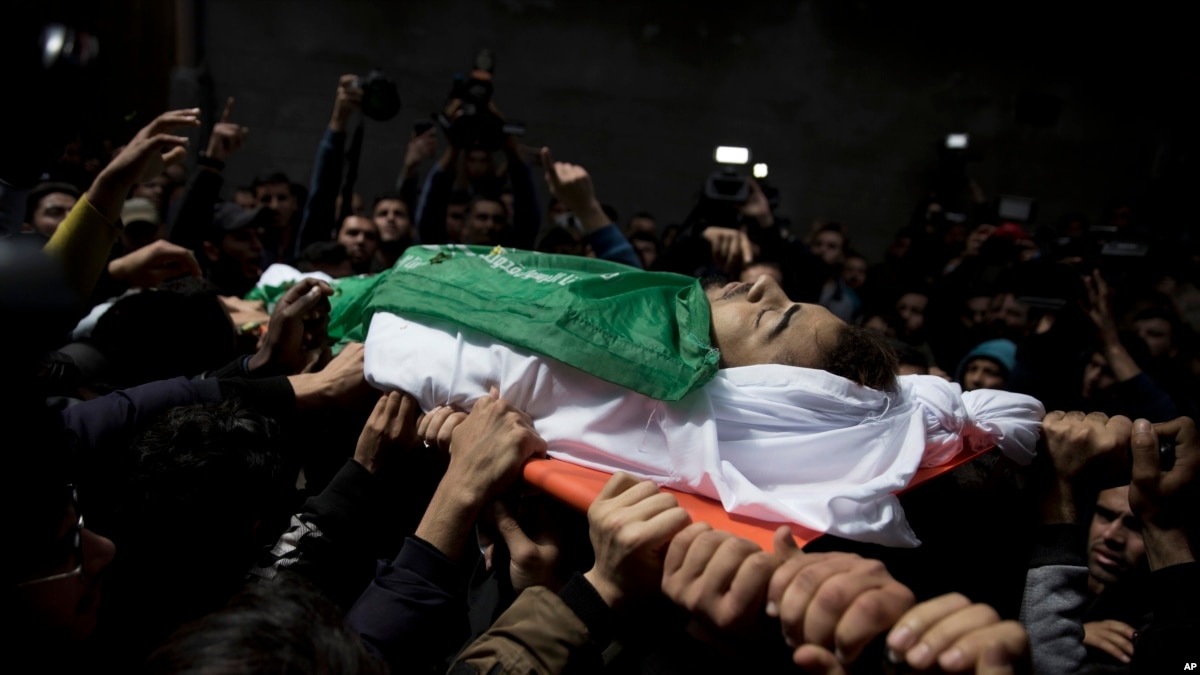
A cease-fire between Israel and Hamas appeared to hold Sunday, with Israel easing some restrictions on a commercial crossing into Gaza and expanding the Mediterranean fishing zone.
Sunday's relative peace and quiet came after days of violence, including Palestinian rocket attacks into Israel, followed by Israeli retaliatory airstrikes.
Tens of thousands of Palestinian protesters rallied in Gaza Saturday -- far fewer than organizers hoped for. Four Palestinians were killed by Israeli fire despite efforts from others to keep the marchers away from the fence along the Israeli border.
Many of the deaths of protesters during previous marches came when soldiers opened fire at militants apparently trying to sneak into Israel across the fence.
Militants fired a rocket at southern Israel early Sunday, setting-off air-raid sirens but failing to hit its target. No one claimed responsibility and Israel did not respond with force.
Hamas officials say Egyptian mediators are trying to negotiate a firmer and more definitive cease-fire. Israel has not commented on any such talks.
Palestinian protesters have been demanding the right of return to lands they say were stolen from their families when Israel was founded as a nation in 1948.
They also want an end to Israeli settlement activity in areas they see as part of a future Palestinian state.
Israel regards Hamas as a terrorist group that refuses to recognize Israel's right to exist. Israel says it will do all it can to defend itself.
Arab Leaders to Seek UN Security Council Resolution on Golan

Arab leaders said on Sunday they would seek a U.N. Security Council resolution against the U.S. decision to recognise Israeli sovereignty over the Golan Heights and promised to support Palestinians in their bid for statehood.
Arab leaders, long divided by regional rivalries, also ended their annual summit in Tunisia calling for cooperation with non-Arab Iran based on non-interference in each others' affairs.
Arab leaders who have been grappling with a bitter Gulf Arab dispute, splits over Iran's regional influence, the war in Yemen and unrest in Algeria and Sudan sought common ground after Washington recognized Israel's sovereignty over the Golan.
But the abrupt departure from the summit shortly after it began by Qatari Emir Sheikh Tamim bin Hamad al-Thani, who is locked in a row with Saudi Arabia and other Arab states, suggested rivalries were not easily buried. No reason was given for his departure.
"We, the leaders of the Arab countries gathered in Tunisia ... express our rejection and condemnation of the United States decision to recognize Israel's sovereignty over the Golan," Arab League Secretary General Ahmed Aboul Gheit said.
He said Arab countries would present a draft resolution to the U.N. Security Council and seek a legal opinion from the International Court of Justice on the U.S. decision. It warned other countries away from following Washington's lead.
Trump signed a proclamation last week recognizing the Golan Heights as part of Israel, which annexed the area in 1981 after capturing it from Syria in 1967.
Trump's earlier decision to recognize Jerusalem as Israel's capital also drew Arab condemnation. Palestinians want East Jerusalem as the capital of a future state.
Saudi Arabia's King Salman bin Abdulaziz told the Arab leaders his country "absolutely rejects" any measures affecting Syria's sovereignty over the Golan Heights.
Tunisian President Beji Caid Essebsi said Arab nations needed to ensure the international community understood the centrality of the Palestinian cause to Arab nations.
In their final communique, Arab states renewed support for an Arab peace initiative that offers Israel peace in exchange for withdrawal from all lands occupied in the 1967 war and said they would seek to revive peace talks with the Jewish state.
U.N. Secretary-General Antonio Guterres, who also addressed the meeting in Tunis, said any resolution to the Syrian conflict must guarantee the territorial integrity of Syria "including the occupied Golan Heights".
The Tunis summit brought together the rulers of Saudi Arabia and Qatar for the first time at the same gathering since 2017 when Riyadh and its allies imposed a political and economic boycott on Doha.
But Qatar's emir left the summit hall shortly after Arab League Secretary-General Ahmed Aboul Gheit praised the way Saudi Arabia handled its rotating Arab League presidency last year, live television footage showed.
Qatar's state news agency did not say why the Qatari emir left, but Tunisia's state news agency TAP said the rest of Qatar's delegation stayed.
Saudi Arabia, the United Arab Emirates, Bahrain and Egypt accuse Qatar of supporting terrorism and say it has been cosying up to Iran, a charge Doha denies.
The row has defied mediation efforts by Kuwait and the United States, which called on Gulf Arab states to unite in opposition to Iranian influence in the region.
The final communique said Arab states called for ties with Iran to "be based on good neighborliness, non-interference in internal affairs, the non-use of force or threats, and refraining from practices and actions that would undermine confidence and stability in the region."
Arab states remain divided over other issues, including how to deal with pro-democracy protests that have erupted in the region since 2011. The presidents of Sudan and Algeria, two nations roiled by anti-government protests, did not attend the summit.
Syria's seat at the summit was vacant. Damascus as been suspended from the League since 2011 over its crackdown on protesters at the start of its civil war. The League has said no consensus has yet been reached to allow Syria's reinstatement.
Campaign Questions Mental Fitness of Netanyahu's Rival
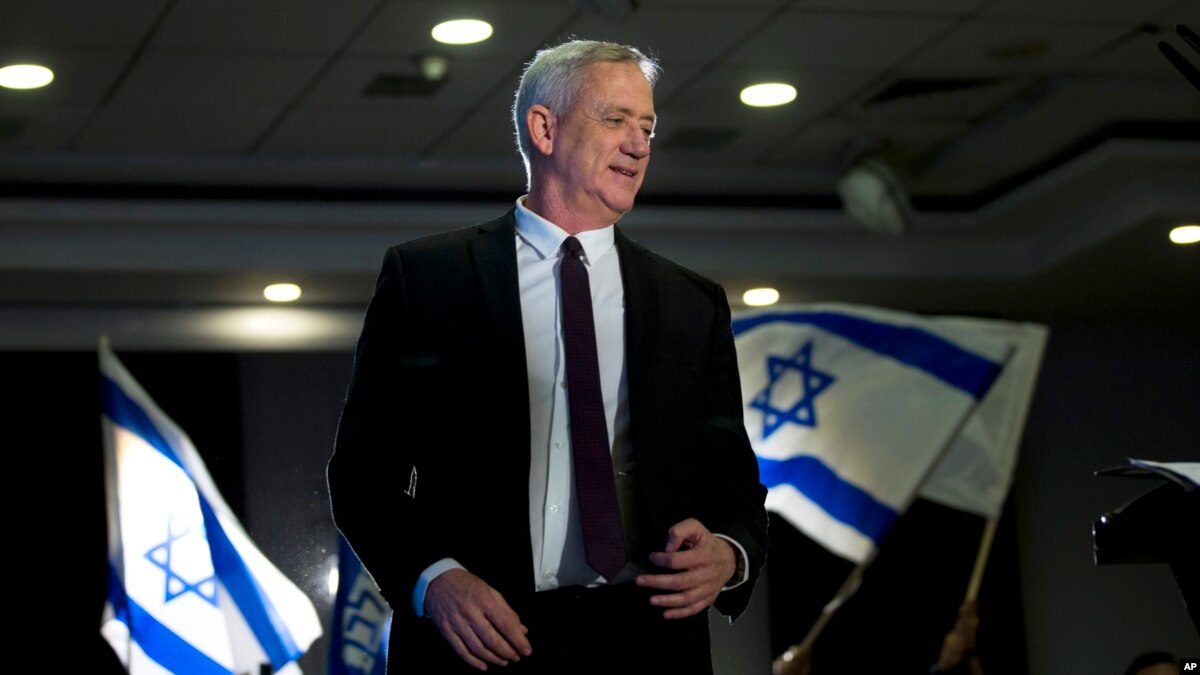
Down in the polls, Israeli Prime Minister Benjamin Netanyahu's Likud Party has released a new campaign trying to paint his main rival, former military chief Benny Gantz, as mentally unstable.
The video ads are the latest move in a campaign that has been heavy on personal insults and short on substance. Elections are scheduled on April 9.
Recent polls have placed Gantz's Blue and White party ahead of Likud. Gantz's campaign has stressed his security credentials - an important quality with the Israeli electorate.
But since Gantz fumbled two television interviews last week, Likud has tried to capitalize by publishing a video with extracts zooming in on the former general's wide-eyed look with the signature violin screech from Alfred Hitchcock's "Psycho" playing in the background.
The Likud captioned the video: "Completely stable."
Israelis have grown long accustomed to negative campaigning.
In 2015 elections, Netanyahu released an election-day video warning that Arab voters were streaming to the polls as he beseeched his supporters to turn out. In the current election, he has drawn accusations of incitement by claiming his opponents will cooperate with Arab politicians.
Gantz's campaign has tried to capitalize on a series of corruption investigations against Netanyahu, while also criticizing his inability to halt rocket fire from the Gaza Strip on southern Israel.
Netanyahu marked his 10th year in office on Sunday, and is now seeking his fourth consecutive term. Combined with an earlier term in the 1990s, Netanyahu will surpass David Ben Gurion, Israel's founding prime minister, as the longest serving leader of the country if re-elected.
His latest tactic against Gantz has dismayed Israeli psychologists and former comrades of the retired general.
A Maariv newspaper columnist published an unsourced claim on Friday claiming that after retiring from the military in 2015, Gantz was "treated by a psychologist" and received "prescription medication."
The publication prompted Gantz to issue a denial, insisting he had met with an "organizational consultant." Employing Hebrew wordplay -the terms for "pill" and "bullet" are identical - Gantz said the only ones he knew were "5.56 and 7.62," calibers for M-16 and AK-47 assault rifles.
Amir Eshel, a former air force chief who served alongside Gantz, defended his former commander in Sunday's Yedioth Ahronoth daily.
"To call a chief of staff who dedicated his life to the state 'insane' just because of a political rivalry is an act you don't do," he wrote.
The Israel Psychology Association issued a statement protesting "the delegitimization of those who receive psychological treatment," saying seeking counseling is "a virtue not a shortcoming."
It called on politicians to "deal with mental health in an appropriate and respectful manner."
Top Algerian Businessman is Arrested at Tunisian Border
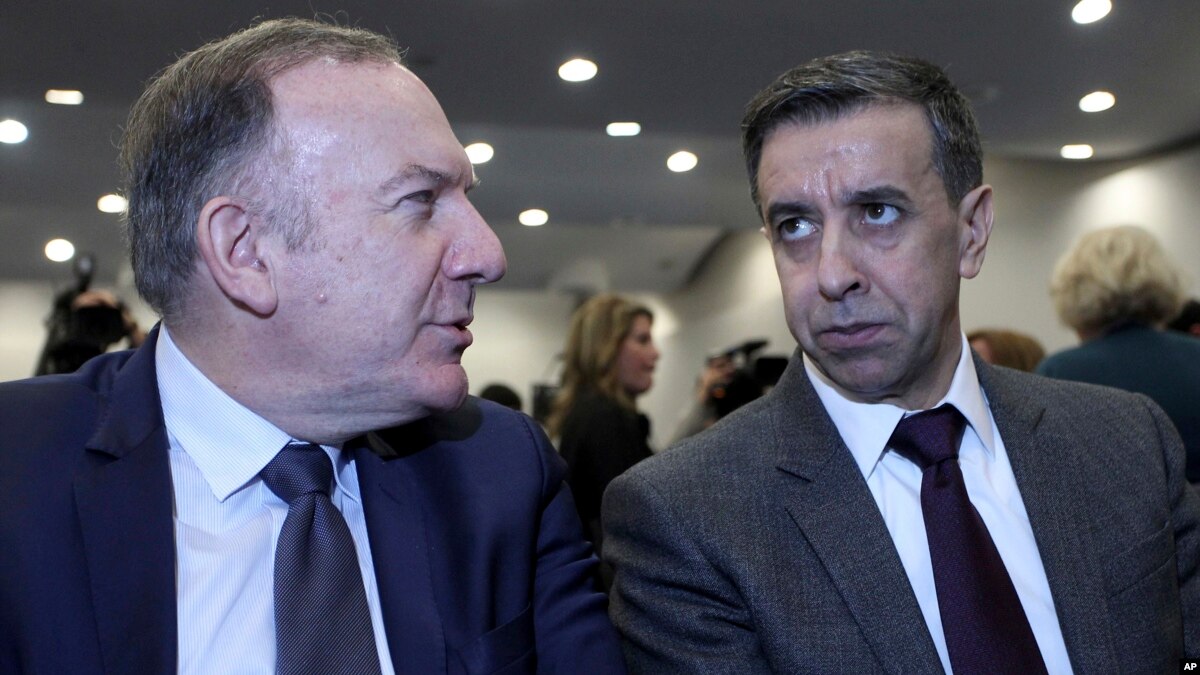
Algerian media say a top Algerian businessman, Ali Haddad, has been arrested at an Algerian border post as he was apparently trying to go to Tunisia amid political crisis in the country.
Journalists at Haddad's private television channel Dzair News said he was arrested overnight in Oum Tboul, close to the Tunisian border, confirming a report from the daily El Watan.
Haddad, long a backer of President Abdelaziz Bouteflika, resigned this week as head of Algeria's Business Forum, apparently trying to distance himself from the unpopular leader whose government has been accused of corruption.
Massive protests started last month to demand that the ailing, 82-year-old president resign. Bouteflika, who has been in power for 20 years, withdrew from running for a new term but cancelled Algeria's April 18 presidential election.
Netanyahu Warmly Welcomes Brazil's Bolsonaro in Israel
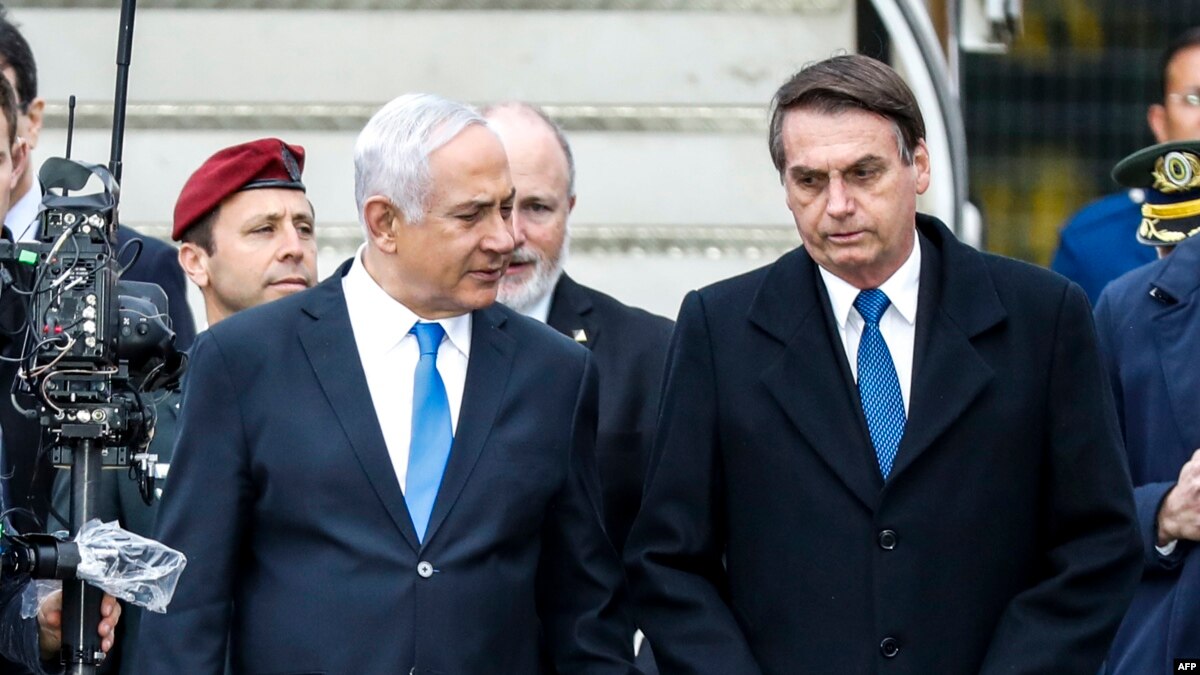
Israel's prime minister warmly received President Jair Bolsonaro Sunday, on the Brazilian leader's first state visit to Israel.
Benjamin Netanyahu's red carpet welcome for Bolsonaro comes days ahead of a tough re-election bid for the long-time Israeli premier on April 9.
The Brazilian president is widely expected during his three-day trip to decide whether to follow President Donald Trump's lead and move the Brazilian Embassy from Tel Aviv to Jerusalem, a move he has repeatedly promised.
The Palestinians claim east Jerusalem, which Israel captured in the 1967 Mideast war, as the capital of a future state. Israel claims all of Jerusalem as its capital, including the eastern sector.
The two leaders, wearing matching blue ties as they surveyed an Israeli color guard, touted the forging of closer ties. Netanyahu addressed Bolsonaro as a ``good friend'' and said Israel and Brazil have entered ``a new era'' of relations.
The Brazilian leader opened his speech after landing with the words "I love Israel" in Hebrew.
"My government is firmly decided to strengthen the partnership between Brazil and Israel," Bolsonaro added.
Netanyahu has faced criticism for courting the friendship of authoritarian leaders, such as Hungary's Victor Orban, Russia's Vladimir Putin and the Philippines' Rodrigo Duterte, in his push for closer ties around the globe.
Bolsonaro has drawn criticism for making disparaging remarks about gays, women, indigenous groups and blacks during his 28-year career as a Brazilian congressman. Rights groups have expressed concern about the new administration's hardline approach to security and protection for police officers who commit crimes.
Israeli activists protested outside the airport after Bolsonaro landed, raising a rainbow flag with the words "The Holy Land doesn't want homophobes here" in Portuguese.
Netanyahu Warmly Welcomes Brazil's Bolsonaro in Israel
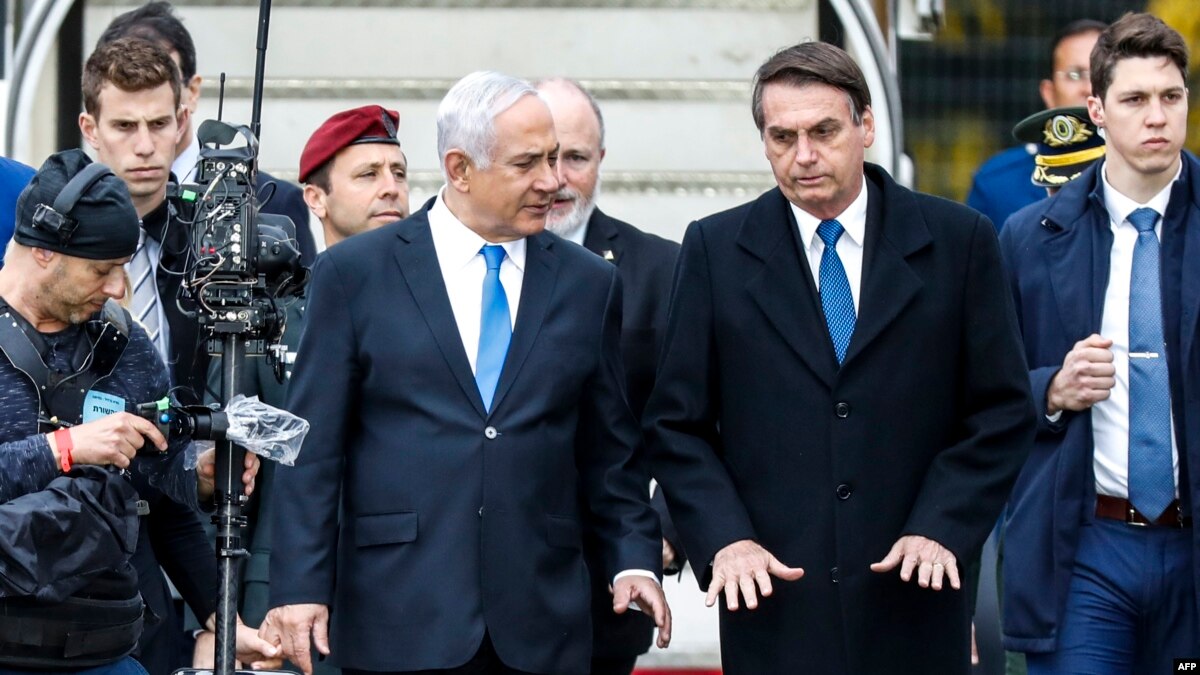
Israel's prime minister warmly received President Jair Bolsonaro Sunday, on the Brazilian leader's first state visit to Israel.
Benjamin Netanyahu's red carpet welcome for Bolsonaro comes days ahead of a tough re-election bid for the long-time Israeli premier on April 9.
The Brazilian president is widely expected during his three-day trip to decide whether to follow President Donald Trump's lead and move the Brazilian Embassy from Tel Aviv to Jerusalem, a move he has repeatedly promised.
The Palestinians claim east Jerusalem, which Israel captured in the 1967 Mideast war, as the capital of a future state. Israel claims all of Jerusalem as its capital, including the eastern sector.
The two leaders, wearing matching blue ties as they surveyed an Israeli color guard, touted the forging of closer ties. Netanyahu addressed Bolsonaro as a "good friend" and said Israel and Brazil have entered "a new era" of relations.
The Brazilian leader opened his speech after landing with the words "I love Israel" in Hebrew.
"My government is firmly decided to strengthen the partnership between Brazil and Israel," Bolsonaro added.
Netanyahu has faced criticism for courting the friendship of authoritarian leaders, such as Hungary's Victor Orban, Russia's Vladimir Putin and the Philippines' Rodrigo Duterte, in his push for closer ties around the globe.
Bolsonaro has drawn criticism for making disparaging remarks about gays, women, indigenous groups and blacks during his 28-year career as a Brazilian congressman. Rights groups have expressed concern about the new administration's hardline approach to security and protection for police officers who commit crimes.
Israeli activists protested outside the airport after Bolsonaro landed, raising a rainbow flag with the words "The Holy Land doesn't want homophobes here" in Portuguese.
Israel Reopens Gaza Crossings After Week of Hostilities
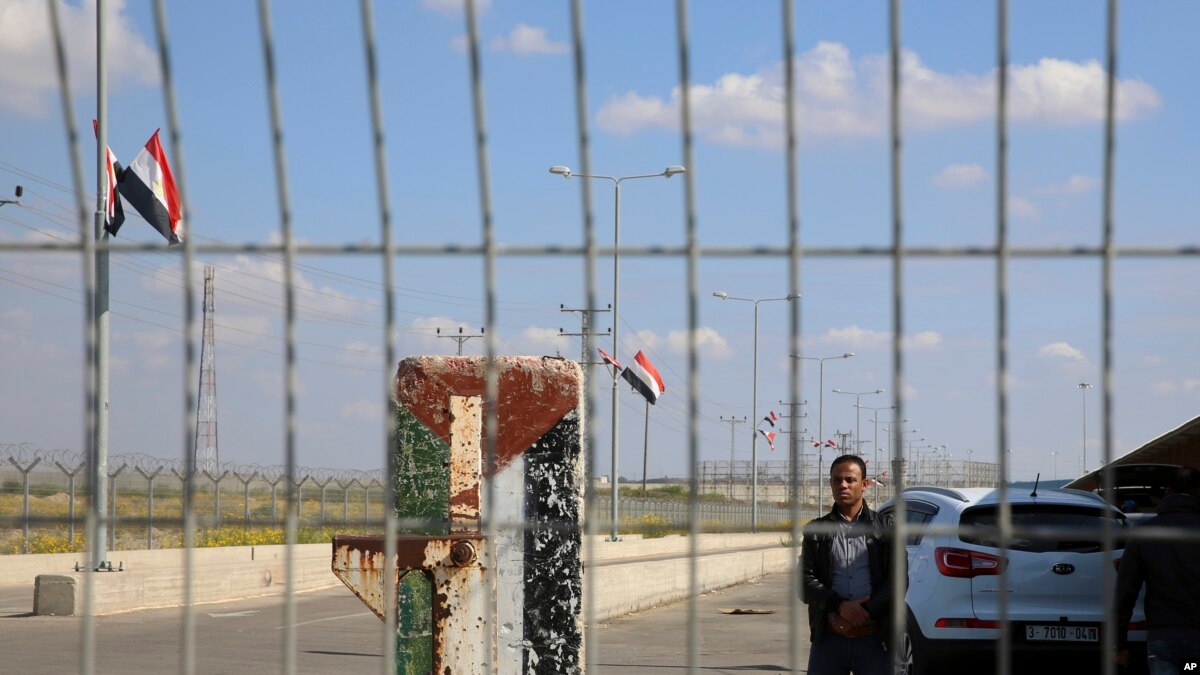
Israeli authorities have reopened the two crossings with the Gaza Strip after days of hostilities in a sign that cease-fire talks may be advancing.
Israeli and Hamas officials confirmed Sunday that the Erez and Kerem Shalom crossings were opened for the first time since Monday. The officials spoke on condition of anonymity.
Sunday's reopening comes hours after Palestinian militants launched rockets into Israel overnight and the military responded with tank fire.
Four Palestinians, including three teens, died a day earlier from Israeli fire as tens of thousands took part in mass protests along the Israel-Gaza perimeter fence.
Egyptian mediators have tried to reach a cease-fire agreement to end six days of hostilities, which began when a rocket fired by Palestinian militants struck a home near Tel Aviv Monday.
Reports: Man Kills 7 Family Members in Iran
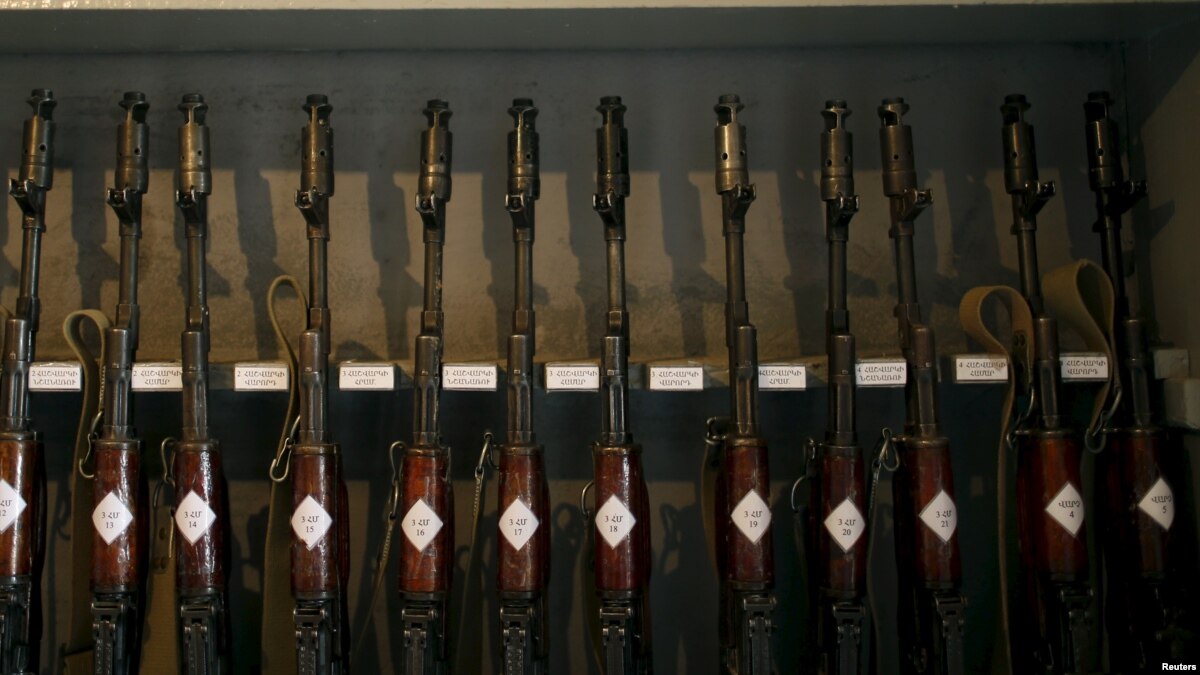
Iranian media says a man has shot dead seven members of his wife’s family in the southwestern city of Dezful.
The state-owned IRNA news agency said Sunday the shooter wielded a Kalashnikov rifle killing five men and two women, before shooting himself.
The agency reported the shooter survived and is in hospital, but did not release his name.
Gun violence is rare in Iran, where citizens are only allowed to own licensed hunting rifles.
In January 2017, a man gunned down five people in a rampage in the central Iranian city of Arak. A month earlier a man killed 10 relatives in a remote rural area in the country’s south.
Saturday, March 30, 2019
Israeli Salt Cave Declared World's Largest
[unable to retrieve full-text content]
Israeli researchers say a massive cavern on the shores of the Dead Sea is the world's largest salt cave. VOA's Kevin Enochs reports on the discovery of this relatively young, beautiful inner sanctum. Read More Israeli Salt Cave Declared World's Largest : https://ift.tt/2FDoie1Algerian Army Repeats Call to Declare President Unfit for Office
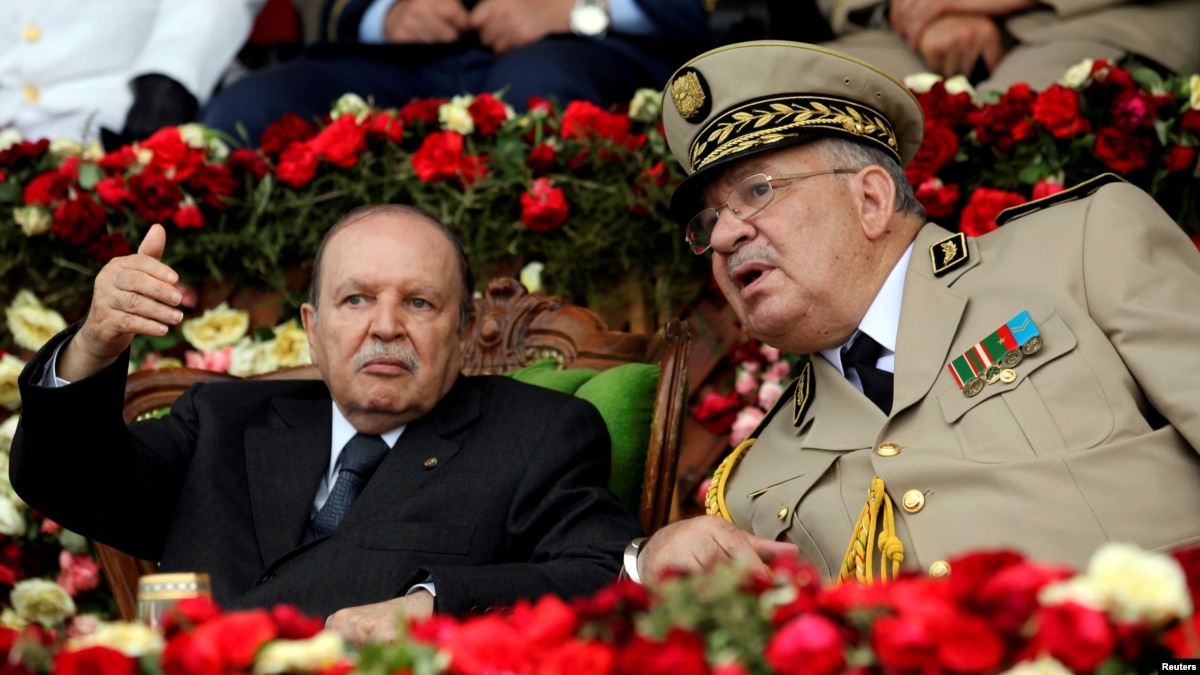
Algeria's army chief renewed a call for President Abdelaziz Bouteflika to be declared unfit for office and told opponents not to seek to undermine the military, after weeks of protests demanding an end to the ailing leader's 20-year rule.
Bouteflika, 82, who has rarely been seen in public in recent years, has faced mass demonstrations for more than a month. His announcement that he would not seek a fifth term but that he would not quit immediately has failed to assuage protesters.
To break the stalemate, Army Chief of Staff Lt. Gen. Ahmed Gaed Salah made a proposal on Tuesday for the constitutional council to declare Bouteflika unfit for office, a move provided for under Article 102 of the charter.
Salah said in a statement issued by the Defense Ministry on Saturday that most people supported the army's plan but some were resisting, without naming those opposed to the move. He said these opponents met Saturday to start a media campaign against the army, claiming people were against Salah's proposals.
'Red line'
He said trying to undermine the military, a revered institution in Algeria whose support has long been seen as vital to keeping Bouteflika and the ruling elite in power, was a "red line" that should not be crossed. He did not elaborate.
"All that emerges from these suspicious meetings of proposals that do not conform to constitutional legitimacy or undermine the national army, which is a red line, is totally unacceptable," he said in the statement.
Bouteflika established himself in the early 2000s by ending a civil war that had claimed 200,000 lives. But he has rarely been seen in public since suffering a stroke in 2013, and now faces the biggest crisis of his two-decade rule.
Under the constitution, the chairman of parliament's upper house, Abdelkader Bensalah, would serve as caretaker president for at least 45 days if Bouteflika stepped down.
However, there is no obvious long-term successor to rule the nation, which secured independence from France in 1962 after years of conflict and was embroiled in a bloody Islamist insurgency during the 1990s.
Aid Groups Scrambling to Stem Cholera in Yemen
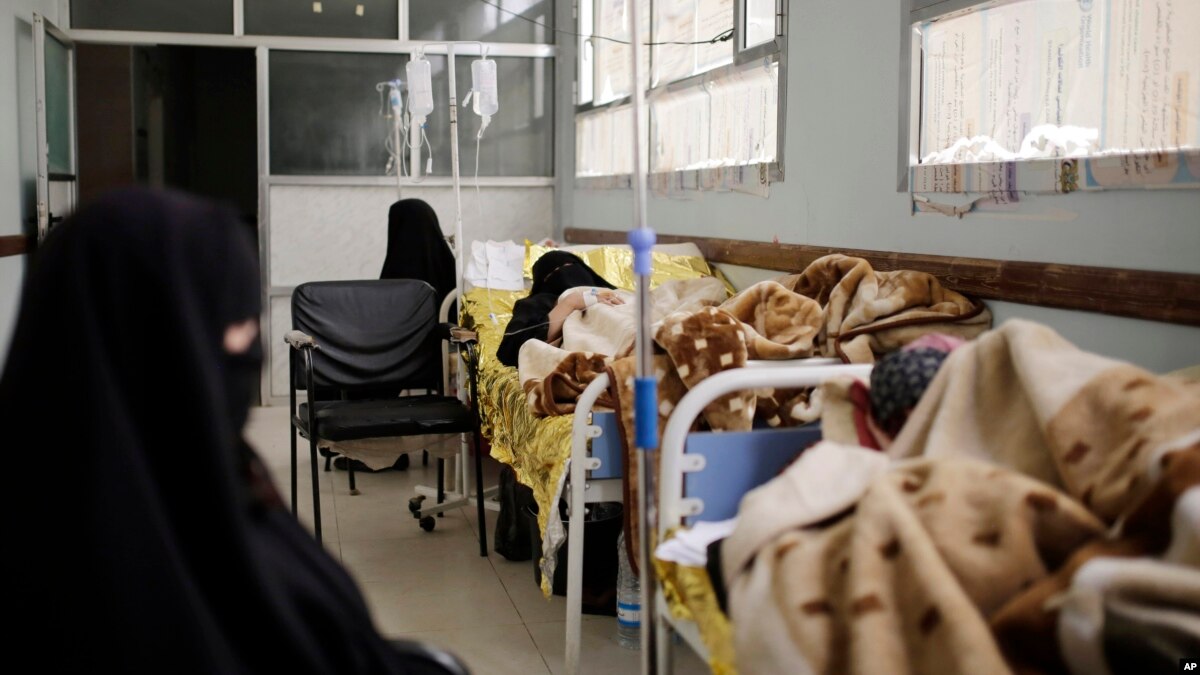
Aid agencies are springing into action to prevent another devastating cholera epidemic in Yemen as cases of this deadly disease continue to increase in this conflict-ridden country.
Since the beginning of the year, the United Nations reports more than 109,000 suspected cases of cholera, including nearly 200 deaths in Yemen. Children represent 27 percent of the total number of suspected cases.
The Yemeni people and health workers are still reeling from the devastation caused by the cholera epidemic that engulfed the country over the past two years. The outbreak that erupted in April 2017 is the worst in recorded history. It affected more than 1.2 million people, killing more than 2,500.
The World Health Organization reports 239 districts in Yemen have reported suspected cholera cases within the last four weeks. WHO spokesman, Tarik Jasarevic, cited the many reasons behind the spike in cases.
“First maybe there is an increased awareness and that leads to increased willingness to seek care and testing. Surveillance has been enhanced, boosting sensitivity. Many of the affected districts do not have or there is no maintenance to sewage disposal systems. Untreated sewage water is being used for irrigation in farming. The use of sewage for fertilization of crops.”
Jasarevic said the early arrival of the rainy season and the large movements of internally displaced people will further increase the number of suspected cholera cases.
Cholera is an acute diarrheal disease that can kill within hours if left untreated. It is caused by a bacterium found in contaminated food and water. Up to 80 percent of cases can be successfully treated with oral rehydration solution. Severe cases will require intravenous fluids and antibiotics.
WHO and partners are scaling up operations to try to contain the spread of this deadly disease. They have set up 413 diarrhea treatment centers and oral rehydration centers in 147 priority districts. They are stockpiling emergency water, sanitation and hygiene supplies. They say more than 400,000 people have received oral cholera vaccines in several districts.
The U.N. children’s fund and WHO are calling for the lifting of all restrictions on their humanitarian operations. They say they must have full access to every child, woman and man in need of medical and other aid to bring this outbreak to an end.
Health Ministry: Palestinian Killed by Israeli Fire in Gaza
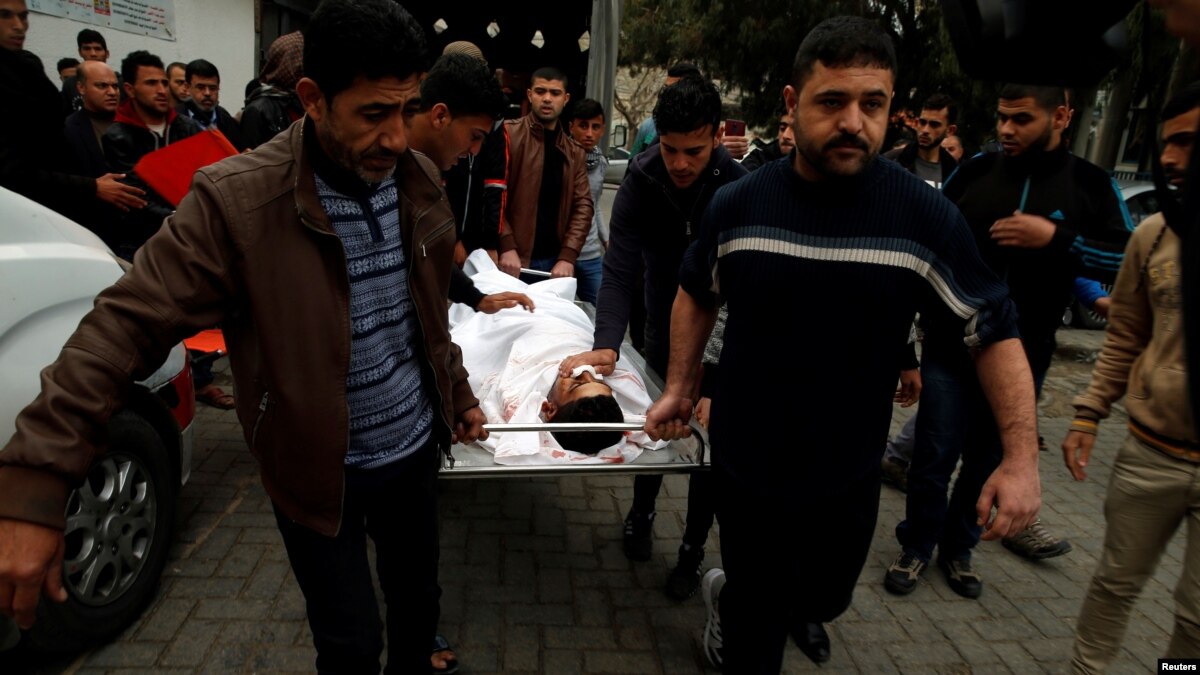
Israeli fire killed a Palestinian man near the Gaza border Saturday, Palestinian Health officials said, as Israel’s forces massed at the frontier ahead of a rally to mark the first anniversary of a surge of Gaza border protests.
The Israeli military said it had not heard of any such incident. Palestinian medics said the man was killed by bullet shrapnel before dawn at a site of frequent night protests near the border.
On Friday night, the Israeli military said Palestinians were throwing explosive devices at the border fence.
Tensions have mounted along the Israel-Gaza border this week ahead of the commemoration of the Great March of Return border protests, which began March 30 last year.
Fighting flared when a Palestinian rocket attack from Gaza wounded seven Israelis in a village north of Tel Aviv on Monday. In response, Israel launched a wave of air strikes and moved armor and reinforcements to the border.
The Israeli forces remained at the border area Saturday, and the military said it was expecting “violent riots” to take place and was prepared for escalation.
Tens of thousands of Palestinians were expected to attend the protests, which have turned deadly in the past, and Egyptian mediators were working to avoid further bloodshed. Leaders of Gazan armed groups Hamas and Islamic Jihad said that progress had been made in the truce talks.
About 200 Gazans have been killed by Israeli troops since the protests started, according to Palestinian Health Ministry figures, and an Israeli soldier was killed by a Palestinian sniper.
The protesters are calling for the lifting of a security blockade imposed by Israel and Egypt, and for Palestinians to have the right to return to land from which their families fled or were forced to flee during Israel’s founding in 1948.
More than 2 million Palestinians are packed into the narrow coastal enclave where poverty and unemployment rates are high.
The blockade is cited by humanitarian agencies as a key reason for impoverishment in Gaza.
Friday, March 29, 2019
Syrian Immigrants, Now Turkish Citizens, Ready Vote in Elections
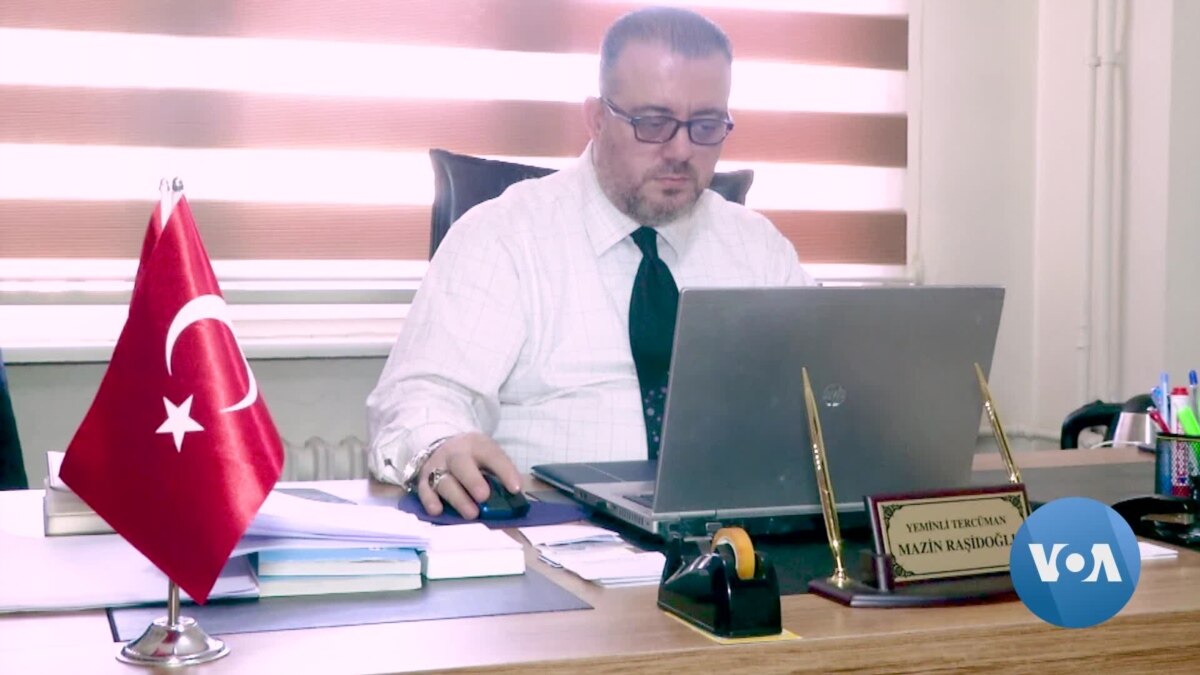
More than 3.5 million Syrian refugees migrated to Turkey since the Syrian crisis began in 2011. In January, Turkish Minister of Interior Suleyman Soylu said that nearly 80,000 of those refugees have become naturalized citizens of Turkey. Roughly 53,000 of which are able to participate in Turkey's elections Sunday. VOA's Tan Cetin spoke to two Syrian-born Turkish citizens to find out what factors play a role in their voting decision and filed this report narrated by Bezhan Hamdard.
Read More Syrian Immigrants, Now Turkish Citizens, Ready Vote in Elections : https://ift.tt/2JR74iRIran Estimates Agricultural Losses from Floods at $180 Million
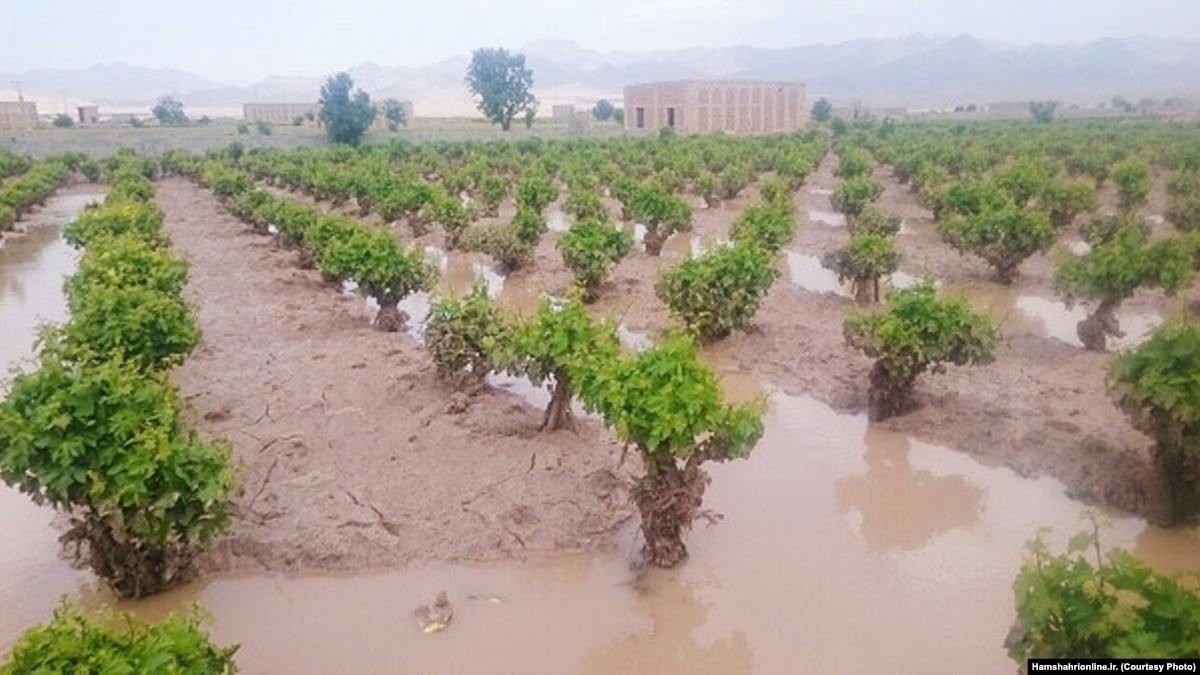
An Iranian official says deadly floods that hit some of Iran’s provinces this week have caused heavy financial losses to the Islamic Republic’s agriculture sector.
A Friday report by Tehran-based state-approved newspaper Hamshahri quoted the head of the agriculture ministry’s crisis management department, Seyyed Mohammad Mousavi, as estimating flood losses at 24 trillion rials, or $180 million, based on the unofficial exchange rate of 135,000 rials to the dollar quoted by bonbast.com Friday.
The Iranian official said the losses were caused primarily in nine Iranian provinces, including Chaharmahal and Bakhtiari, Fars, Golestan, Kermanshah, North Khorasan, Khuzestan, Mazandaran, Semnan, and Sistan and Baluchestan.
Hamshahri cited Mousavi as saying 50 percent of the agricultural losses were related to farms, 23 percent to horticulture, 17 percent to water infrastructure and delivery networks, and 10 percent to livestock and fish.
Death toll at 44
In a Thursday report, Iran’s semi-official Tasnim news agency said floods had killed at least 44 people in 10 provinces since Monday.
In an interview with the Friday edition of VOA Persian’s News at Nine program, Washington-based climate and international security commentator Caitlin Werrell said Iran’s flooding damage was caused by a combination of two factors.
“One is the intensity of the weather event — we saw a huge amount of precipitation happen in a short period of time,” said Werrell, chief executive of The Council on Strategic Risks, a security policy institute.
“That was combined with the conditions on the ground: infrastructure and also … a drought that precedes a flood (and) means that the soil is not as absorbent as it could have been,” she added.
Updated infrastructure needed
Iranian officials acknowledged that outdated agricultural and irrigation systems and poor water management policies in the past decades contributed to nationwide water shortages last year. Below average precipitation exacerbated the situation.
Werrell also said there are steps that countries such as Iran can take to mitigate future flooding disasters, which she predicted will become more frequent as the climate changes.
“Short-term weather forecasting has gotten better, but you also can also put in place things like early warning systems for people who cannot get out of the way, things that I would encourage everybody, not just in Iran, but across the world to be doing,” she said.
This article originated in VOA’s Persian Service.
Egyptian Leader to Meet with Trump Next Month at White House
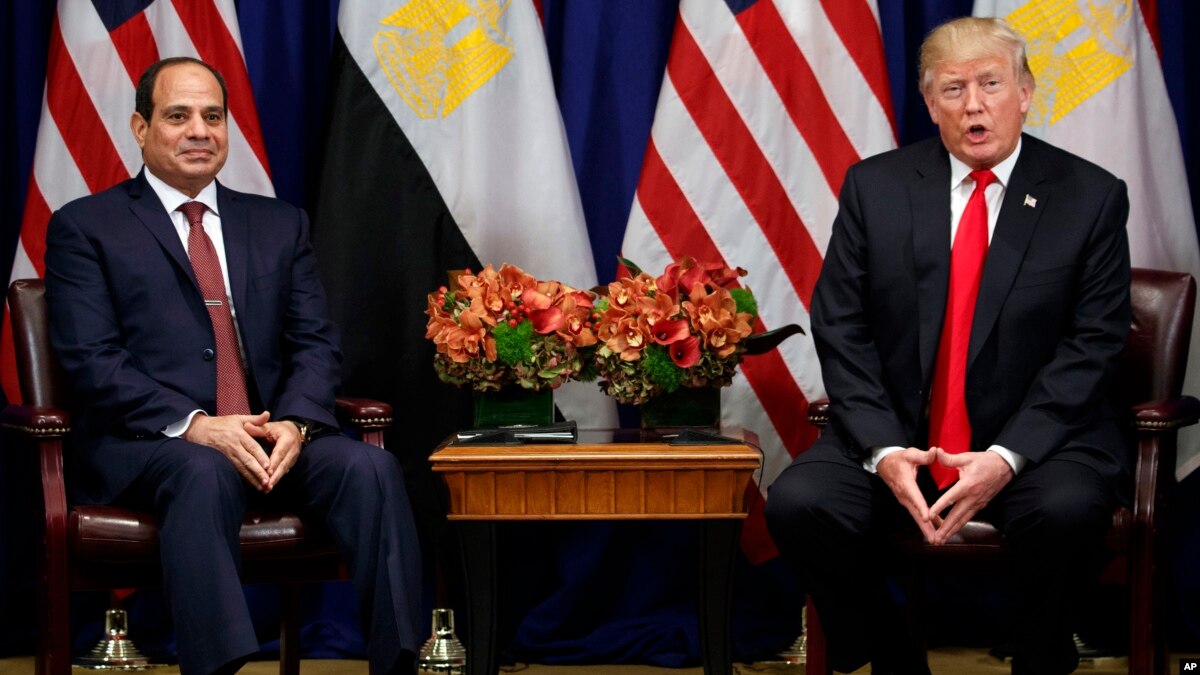
President Donald Trump will meet with Egypt President Abdel-Fattah el-Sissi next month at the White House.
White House press secretary Sarah Sanders says in a statement released Friday the leaders on April 9 will discuss bilateral concerns, including conflicts in the region and military, economic and counterterrorism issues.
Egypt under the ex-general has rolled back many freedoms won by the 2011 uprising in the country. El-Sissi has silenced most dissenting voices in the media and restricted civil society groups.
El-Sissi led the military overthrow of Mohammed Morsi, an elected but divisive Islamist whose rule inspired protests. El-Sissi was elected president in 2014 and re-elected to another four-year term last year after challengers were arrested or pressured to withdraw.
El-Sissi's supporters say he needs more time to develop the economy and defeat an Islamic State-led insurgency.
Algerians March Against President — and Political System
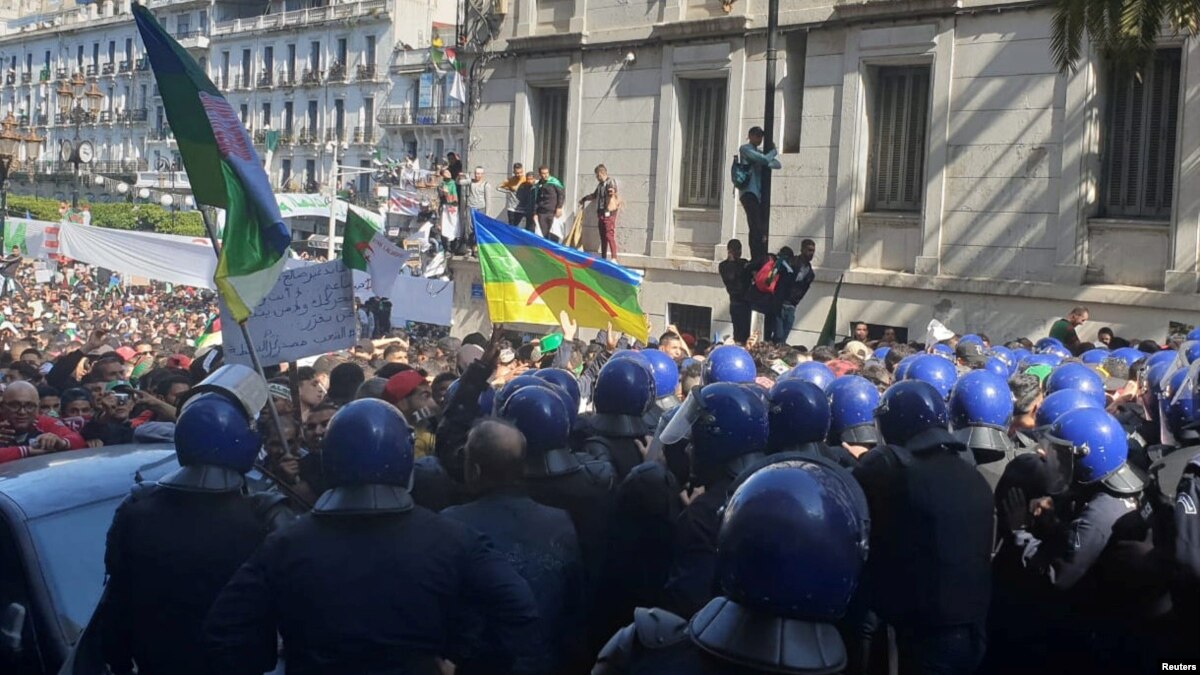
Algerians who took to the streets for their sixth straight Friday of protests aren't just angry at their ailing president — they want to bring down an entire political system seen as corrupt and out of touch.
Tens of thousands massed in the boulevards of Algiers on Friday, dominated by young people and their families. Police helicopters circled overhead and riot police vans lined sensitive neighborhoods, but the mood was largely festive.
It's the first protest since the Algerian army chief called earlier this week for a constitutional process to declare President Abdelaziz Bouteflika unfit for office. Other politicians and parties backed the idea as a solution to the gas-rich country's political crisis.
But protesters see the proposal as a way for the secretive political elite to keep their grip on power and name a hand-picked successor to Bouteflika, who has been largely out of the public eye since a 2013 stroke.
Anger at the constitutional process issue is central to Friday's protest. Many held signs calling for the departure of army chief Ahmed Gaid Salah, or referring to Article 102 of the constitution, which Salah proposed using to pave the way for Bouteflika's ouster.
One sign accused the political elite of being "Ali Baba and the 40 Thieves." Another read "Not Moscow, Not Paris, Not Washington — The Choice should be Algerian," in reference to concerns of foreign interference in the crisis.
A former French colony with close ties to France, Algeria was a powerful ally of Moscow in the Soviet era but in recent years has also become a key partner of the U.S. and Europe in fighting terrorism.
Frustration also targeted Bouteflika's brother, Said. A small group of protesters started shoving journalists from Ennahar Television, considered close to Said Bouteflika, shouting "Shame!," before other protesters separated them.
When the protests broke out last month, the demonstrators' anger was more focused on Bouteflika himself, and demands that he abandon his bid for a fifth term after 20 years in power.
Since then, Bouteflika has dropped his election bid, but also canceled the April 18 vote pending electoral reforms, raising fears he would cling to power indefinitely.
Bouteflika is credited with bringing peace to his nation after the bloody civil war of the 1990s, but some of his most powerful supporters have turned against him this week.
The protesters are notably angry at corruption. An Algerian media executive who was detained Thursday and released hours later said he was arrested because he publicly denounced political corruption.
Thursday, March 28, 2019
Bodies of About 30 Yazidi Exhumed in Iraq Mass Grave

In recent weeks, Iraqi and United Nation's workers have exhumed what they believe to be the remains of 30 bodies of Yazidi victims of Islamic State militants from one of dozens of mass graves in the region. Thousands were killed and thousands more remain missing after being captured and enslaved by IS in what the United Nations has called a possible genocide. VOA's Heather Murdock has this report from Kocho, Iraq.
Read More Bodies of About 30 Yazidi Exhumed in Iraq Mass Grave : https://ift.tt/2YBfY7tIran Media: 10 People Die from Drinking Tainted Alcohol
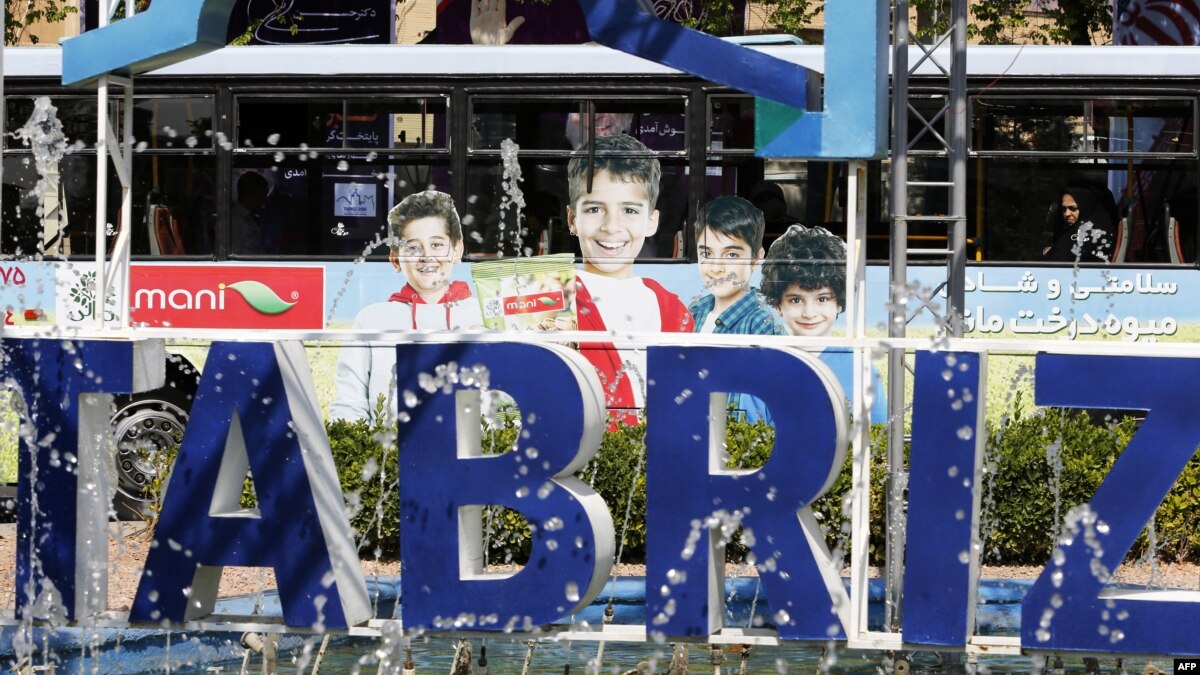
Iran's state-run news agency says 10 people have died from tainted alcohol in northwestern Azarbaijan province while 240 were hospitalized.
IRNA says the alcohol poisoning took place over the past six weeks in the city of Tabriz.
Hodjat Pourfathi, an official with the Health Ministry, is quoted as saying three of the victims were blinded and several were in a coma. He says the fatalities are likely to rise.
IRNA reported 31 deaths from tainted alcohol last October, most of them in southern Hormozgan province.
At the time, the agency said that as the nation's currency plummets against the dollar and the price of liquor rises, consumers increasingly turn to homemade alcohol.
In Iran, drinking alcohol is considered sinful and punishable by flogging and cash fines under Islamic law.
Iran Flash-Flood Death Toll Up to 44
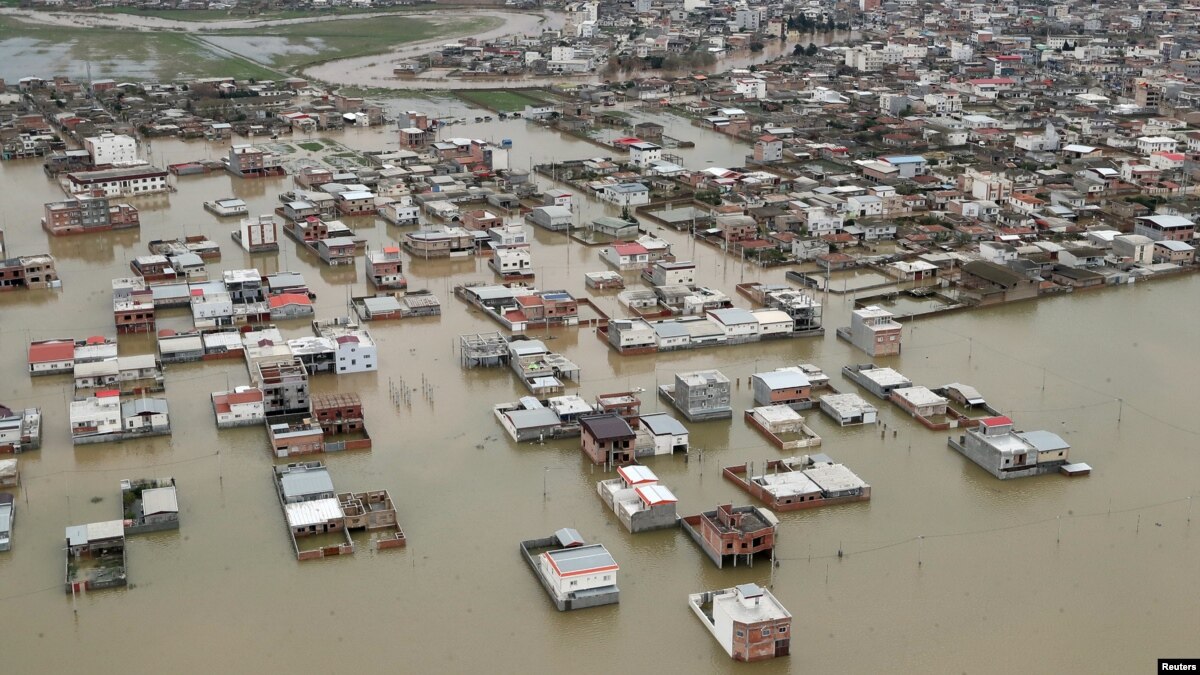
Iran's semi-official Tasnim news agency is reporting that the death toll from flash floods across the country has risen to 44 from 17.
The Thursday report quotes Hamidreza Khankeh, an official in the country's emergency medical services agency, as saying 44 people have died since Monday in 10 provinces.
Since March 19, many roads in Iran have been affected by heavy rainfall that caused flash flooding.
Last year, at least 30 people were killed in flash flooding in the eastern part of neighboring Azerbaijan.
Roughly 30 Yazidi Bodies Exhumed in Iraq
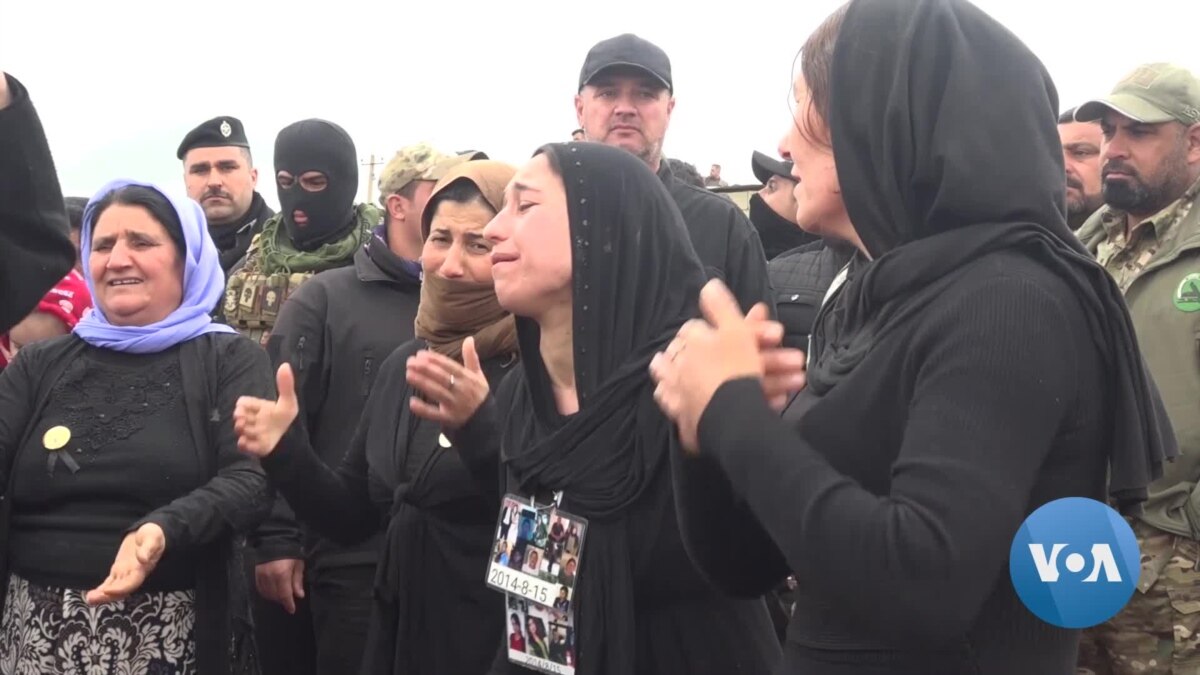
In recent weeks, Iraqi and United Nation’s workers have exhumed what they believe to be the remains of 30 bodies of Yazidi victims of Islamic State militants from one of dozens of mass graves in the region. Thousands were killed and thousands more remain missing after being captured and enslaved by IS in what the United Nations has called a possible genocide. VOA’s Heather Murdock has this report from Kocho in Iraq.
Read More Roughly 30 Yazidi Bodies Exhumed in Iraq : https://ift.tt/2uvuobfSources: 3 Saudi Rights Activists Temporarily Released
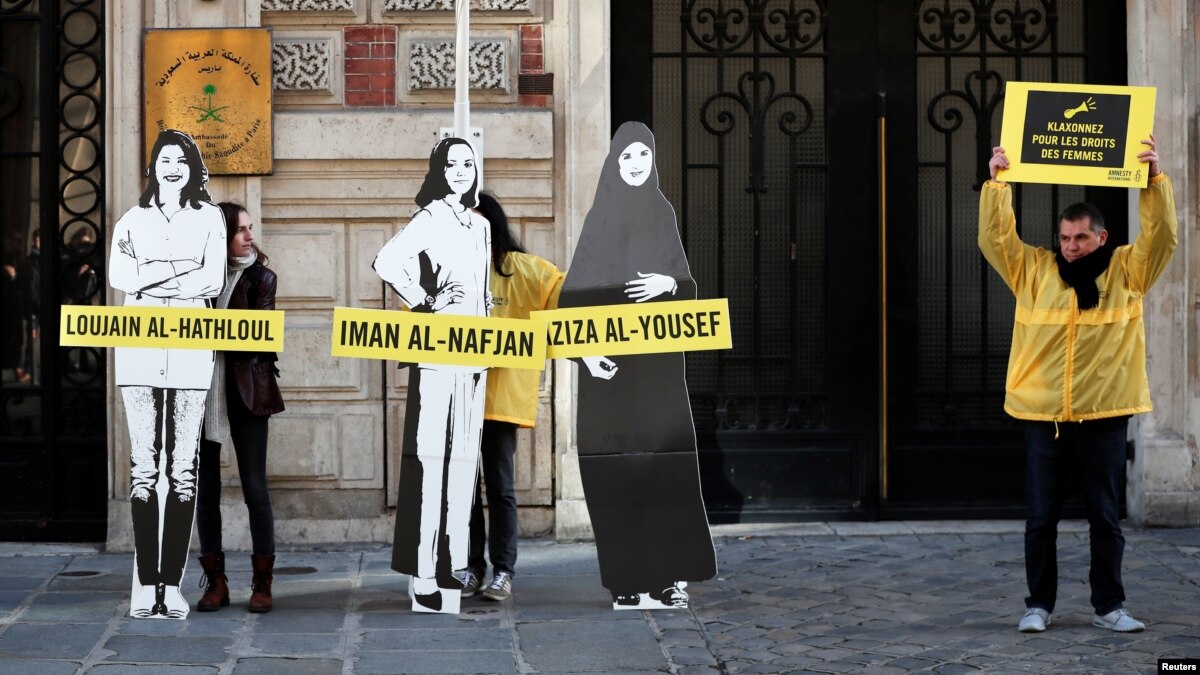
Three Saudi women's rights activists have been temporarily released after 10 months in prison, sources familiar with the case told The Associated Press on Thursday.
Two people told the AP on Thursday that Aziza al-Yousef, a grandmother and former professor; Eman al-Nafjan, a mother of four and linguistics professor, and a third woman were released and at least one of the women was home with her family.
The releases came a day after nearly a dozen Saudi women's rights activists appeared before a three-judge panel in a Riyadh courtroom and laid out their defense. They also spoke of physical and sexual abuse they say they were subjected to by masked interrogators.
This is the first time they have been released from detention since May of last year.
The women, who appeared Wednesday in their second court session since their arrests in May, had long pushed for the right to drive and called for an end to restrictive male guardianship laws. The laws require women of all ages to have a male relative's consent to travel abroad, obtain a passport, marry or undergo certain medical procedures.
Wednesday, March 27, 2019
Syrian Army: Israeli Strikes Hit Aleppo, Damage Materials
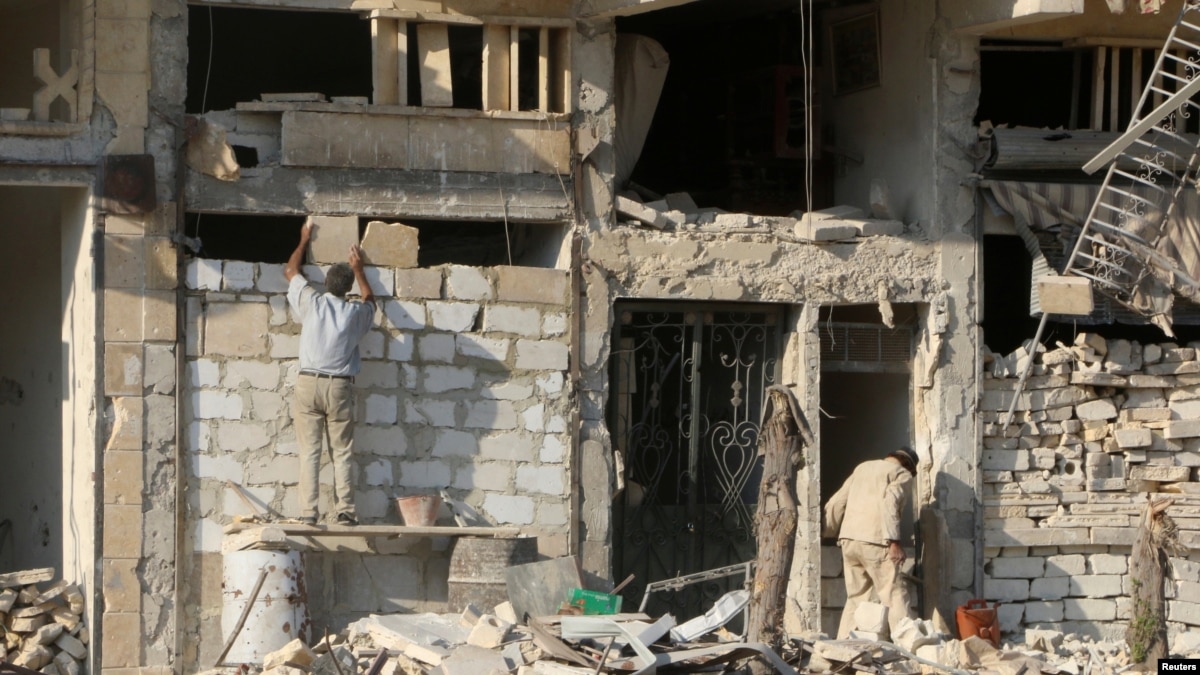
The Syrian military said Israel launched raids Wednesday on an industrial zone in the northern city of Aleppo, causing damage only to materials, while opposition sources said the strikes hit Iranian ammunitions stores and a military airport used by Tehran’s forces.
“The Israeli aggression targeted some positions in Sheikh Najjar industrial zone and a number of enemy missiles were brought down,” an army statement said.
There was no immediate comment from Israel.
The blasts caused an electrical blackout in Aleppo, the country’s second largest city and a major industrial hub that bore the brunt of years of fighting and heavy Russian and Syrian aerial bombardment on its former rebel-held areas.
Military experts say Aleppo is one of the main areas where Iran’s elite Revolutionary Guards have a strong military presence supporting local militias that have for years been fighting alongside the Syrian army to defeat insurgents.
Two opposition sources familiar with Tehran’s military presence in the area said large ammunitions depot and a logistics hub that belonged to Iranian-backed militias inside the industrial zone received direct hits.
Other strikes hit the vicinity of Nairab military airport on the outskirts of Aleppo in the second such strike on the installation used by Iranian troops in less than a year, they added.
Iranian-backed Shiite militias have expanded their control over mainly Sunni areas around Damascus, southern and eastern Syria that bore the brunt of the heaviest bombardment and led to mass displacement or emigration to neighboring countries.
Iran’s growing influence in Syria, where it has struck economic and trade deals, has raised the prospect of a military confrontation with its archenemy Israel. Israel, which considers Iran its biggest threat, has repeatedly attacked Iranian targets in Syria and those of allied militia, including Lebanon’s Hezbollah.
With an election approaching, Israel’s government has increased its attacks in Syria and has taken a tougher stance toward Hezbollah on the border with Lebanon.
Iran has warned Israel it would respond if it continued attacking targets in Syria and repeatedly said its military presence in Syria is at the invitation of the Assad government and it has no immediate plans to withdraw.
Ship Reported Hijacked Near Libya by Migrants Rescued at Sea
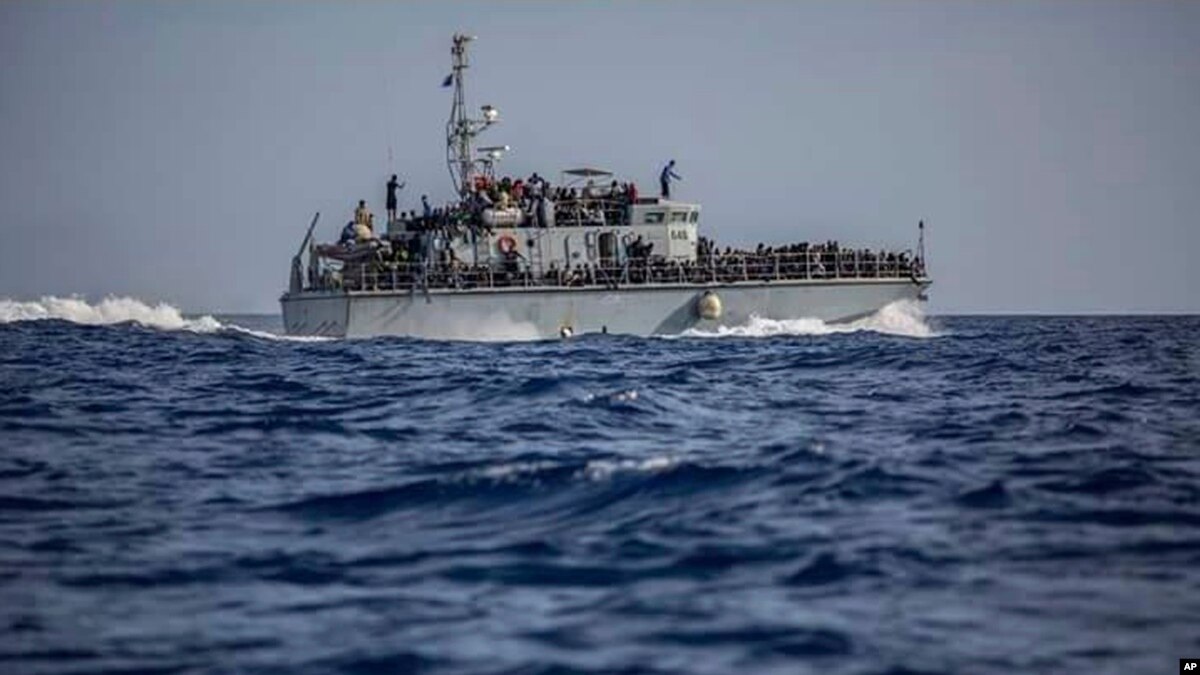
Migrants hijacked a cargo ship in Libyan waters on Wednesday and forced the crew to reroute the vessel north to Europe, according to Italian and Maltese authorities.
The Armed Forces of Malta said military personnel were standing by and the hijacked vessel still was in Libyan territorial waters on Wednesday night.
Italian Interior Minister Matteo Salvini said the merchant ship, El Hiblu 1, rescued migrants in the Mediterranean Sea earlier Wednesday. He says about 120 rescued passengers were on board when the hijacking happened.
Salvini said “it would be the first act of piracy on the high seas with migrants that hijacked” a cargo ship.
Salvini says weather conditions on the water weren't good and it's too early to tell if the ship was being directed toward Malta or Italy's Lampedusa island.
Are We on the Brink of Another Arab Spring?
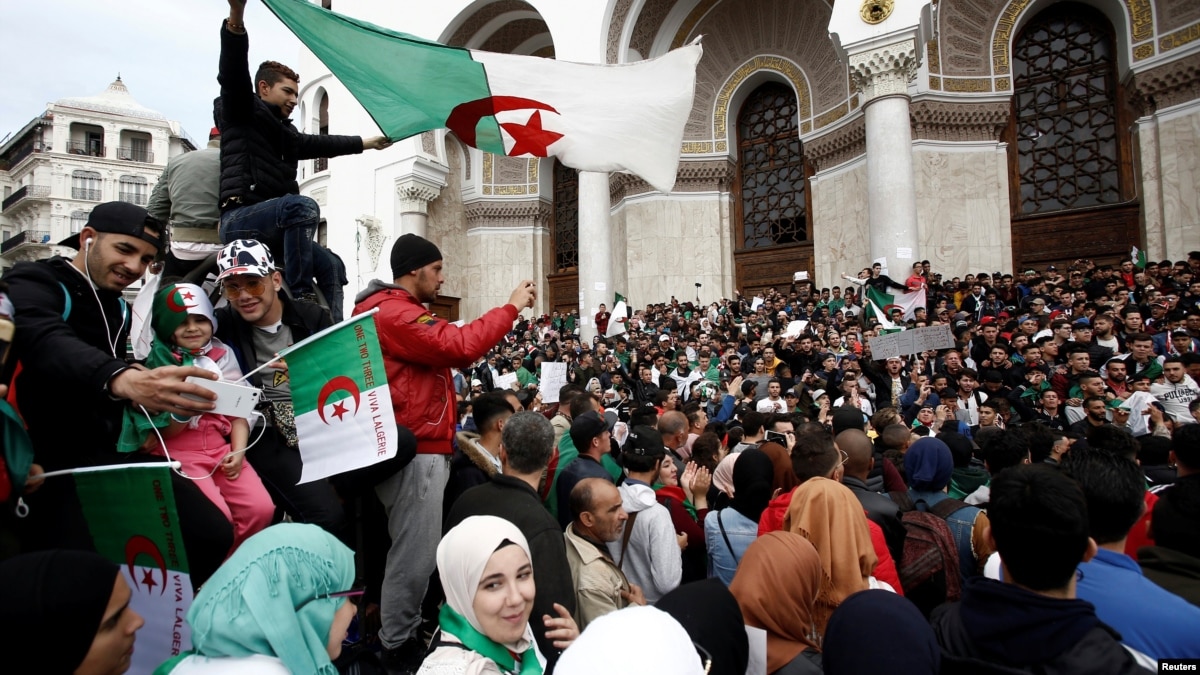
Are anti-government protests in Algeria the herald of an Arab-spring sequel? Some regional autocrats appear to fear so and are cracking down on even the mildest of dissent, say analysts.
For weeks now in Algeria, tens of thousands of protesters drawn from all walks of life have been chanting the Arab-spring mantra, “The people want the regime to go.”
Their hopes of seeing an end to the 20-year-long autocratic rule of President Abdelaziz Bouteflika, who’s rarely been seen in public since suffering a stroke in 2013, have been boosted in the past 24 hours by the intervention of the Algerian army.
Algeria's army chief of staff demanded Tuesday the president be declared unfit to rule, saying he considered the people's demands to be valid and that the presidency should be vacated. “We must find a way out of this crisis immediately, within the constitutional framework,” said Gen. Ahmed Gaed Salah, speaking on national television.
The protests against Bouteflika began last month after the president said he planned to stand for a fifth term.
But it isn’t only in Algeria that protesters in North Africa and the Middle East are venting their anger and once again taking to the streets to demand change.
Demanding changes
Last month, Sudanese President Omar al-Bashir, who’s been in powers for 30 years, imposed curfews, banned public-sector industrial strikes and gave security forces additional powers to quell protesters calling for an end to his rule.
Protests have also been staged in Iran, Tunisia, Iraq, Jordan and Morocco.
And in the Gaza Strip, anti-Hamas protests have erupted recently against tax increases amid demands for better living conditions. Hamas, the militant Islamist movement that controls the coastal enclave has resorted to beating up and detaining demonstrators and arresting journalists.
“The conditions are there for the re-emergence of an ‘Arab uprising’ narrative,” according to Marc Lynch, a political scientist and author of the book "The Arab Uprising: The Unfinished Revolutions of the New Middle East." In a commentary, he added: “Many activists online have again attempted to craft one, built around solidarity among different Arab societies.”
The grievances now appear to be the same as those that fueled the Arab spring — lack of economic opportunity for the young, rising joblessness, stagnant economies, impoverishment and harsh security policies, say analysts.
Sudan’s latest protests were triggered by the government’s decision to triple bread prices. Food prices have jumped since January after the government stopped state-funded wheat imports.
Despite the lifting of U.S. economic sanctions on Sudan, the Sudanese pound has plunged in value against the dollar and international banks remain wary of doing business there.
Algeria has suffered economically with the halving of oil prices. Corruption has reached unprecedented levels and social inequality has increased. A quarter of Algerians under the age of 30 are unemployed and have little prospect of securing work.
As in the Arab spring, regimes have not been slow to crack down on the emerging protests, which as before appear spontaneous and are largely leaderless. Even mild, peaceful dissent is earning punishment. In Bahrain the relatives of an outspoken rights activist, who’s living in exile in Britain, have been jailed after being accused of planting a fake bomb in the kingdom. Rights groups and the United Nations say the case is trumped up and a means to take revenge on the exiled activist.
Different motives
But there are differences from the Arab spring, too.
Protesters in one country aren’t seeking solidarity with counterparts in neighboring countries in the way they did before. This is both a conscious choice, say some observers, as well as a reflection of how regimes are now better at policing the internet and social-media sites.
Another element that’s different is that Arab satellite channels are less forthright in their coverage of the demonstrations and are treating them as isolated local events rather than a regional phenomenon, according to Marc Lynch.
“Arabic broadcast and social media were key factors in transforming Tunisia’s and Egypt’s 2011 uprisings into broader Arab uprisings. Media allowed Arabs across the region to view events there as part of their own story,” he argued in a commentary for the Carnegie Endowment, a Washington DC-based think tank. “Broadcast media, above all Qatar’s pan-Arab satellite television station Al-Jazeera, were critical for bringing this protest narrative to a mass audience,” he says.
He believes the coverage is shaped by politics and that every regime in the region is anxious about an Arab spring sequel, understanding they all have something to lose. So they are all restraining their pan-Arab stations, even when it means losing the opportunity to embarrass regional foes and rivals.
Protesters seem to understand that. They are also being more controlled. In Algeria, anti-government activists are “aware of the risks of an escalation” and are being careful to remain non-violent, argues Youcef Bouandel, an academic at Qatar University.
Read More Are We on the Brink of Another Arab Spring? : https://ift.tt/2JGEksQErdogan, AKP Seek to Win Key Kurdish Vote with Promises of Reconstruction, Peace

Turkey’s ruling AKP Party with its message of services, jobs, and construction is seeking to defeat the country’s main pro-Kurdish HDP party in Sunday’s local elections. One of the main battlegrounds is Diyarbakir, the central city in Turkey’s predominantly Kurdish southeast, a center of a decades-long insurgency by separatists. Dorian Jones reports.
Read More Erdogan, AKP Seek to Win Key Kurdish Vote with Promises of Reconstruction, Peace : https://ift.tt/2UbWdnyTuesday, March 26, 2019
Save The Children: 7 Killed in Airstrike on Yemen Hospital
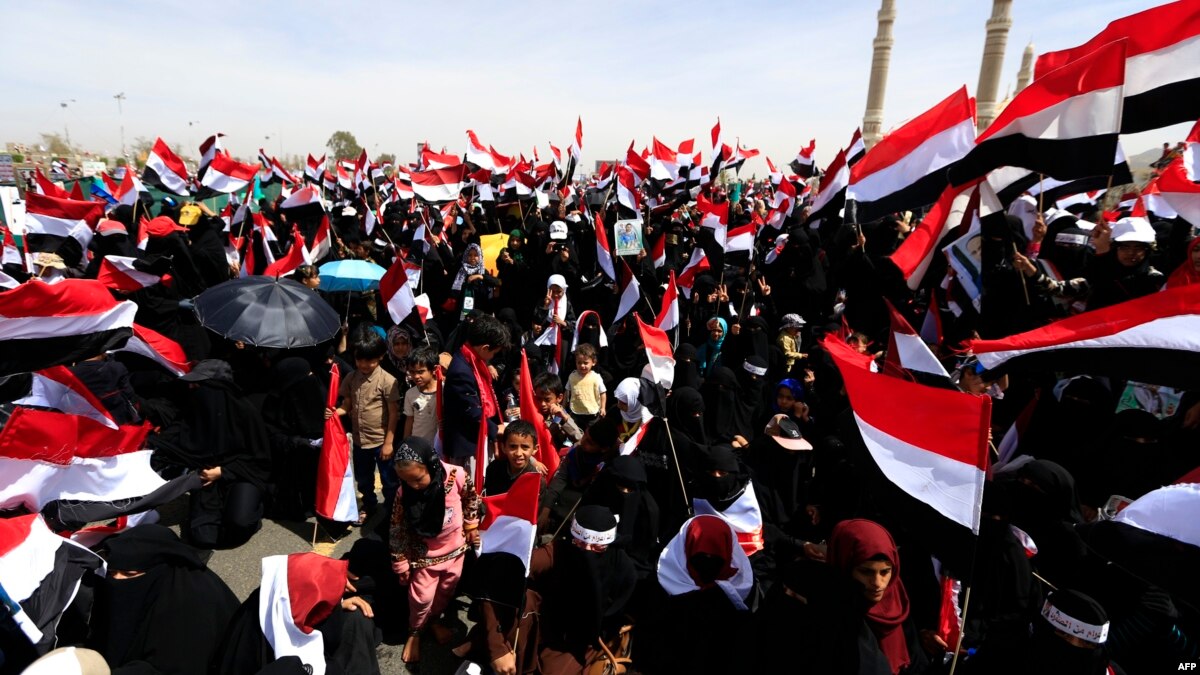
A hospital in a rural area of northwest Yemen was hit by an airstrike Tuesday killing seven people and wounding eight others, Save the Children said.
The international aid organization, which supports the hospital, said in a statement sent to the Associated Press that four of those killed were children and two adults are unaccounted for.
Save The Children said a missile struck a petrol station near the entrance to Ritaf rural hospital, about 100 kilometers (62 miles) from the city of Saada at 9:30 a.m. local time on Tuesday.
“The missile was said to have landed within 50 meters (55 yards) of the facility's main building,” it said.
The organization said the hospital had been open for half an hour and many patients and staff were arriving on a busy morning.
Among the dead were a health worker and the worker's two children and a security guard, it said.
'Breach of international law'
Save the Children, which reported earlier this week that 37 Yemeni children a month had been killed or injured by foreign bombs in the last year, demanded an urgent investigation into the attack.
Helle Thorning-Schmidt, the organization's chief executive, said: “We are shocked and appalled by this outrageous attack.”
“Innocent children and health workers have lost their lives in what appears to been an indiscriminate attack on a hospital in a densely populated civilian area,” she said. “Attacks like these are a breach of international law.”
Thorning-Schmidt said the hospital is one of many Save the Children supports in Yemen, “but time after time, we see a complete disregard by all warring parties in Yemen for the basic rules of war.”
The conflict in Yemen began with the 2014 takeover of the capital, Sanaa, by Iranian-backed Houthi Shiite rebels, who toppled the government of Abed Rabbo Mansour Hadi.
A Saudi-led coalition allied with Hadi's internationally recognized government has been fighting the Houthis since 2015.
Saudi-led airstrikes have hit schools, hospitals and wedding parties and killed thousands of Yemeni civilians. The Houthis have fired long-range missiles into Saudi Arabia and targeted vessels in the Red Sea.
The fighting in the Arab world's poorest country has killed thousands of civilians, left millions suffering from food and medical care shortages, and pushed the country to the brink of famine.
'Just a step away'
U.N. humanitarian chief Mark Lowcock has said about 80 percent of Yemen's population — 24 million people — need humanitarian assistance including nearly 10 million “just a step away from famine” and nearly 240,000 “facing catastrophic levels of hunger.”
Thorning-Schmidt called for an immediate suspension of arms sales to the warring parties and diplomatic pressure to end the conflict.
“We must stop this war on children,” she said.
Algerian Army Chief Wants President Declared Unfit to Lead
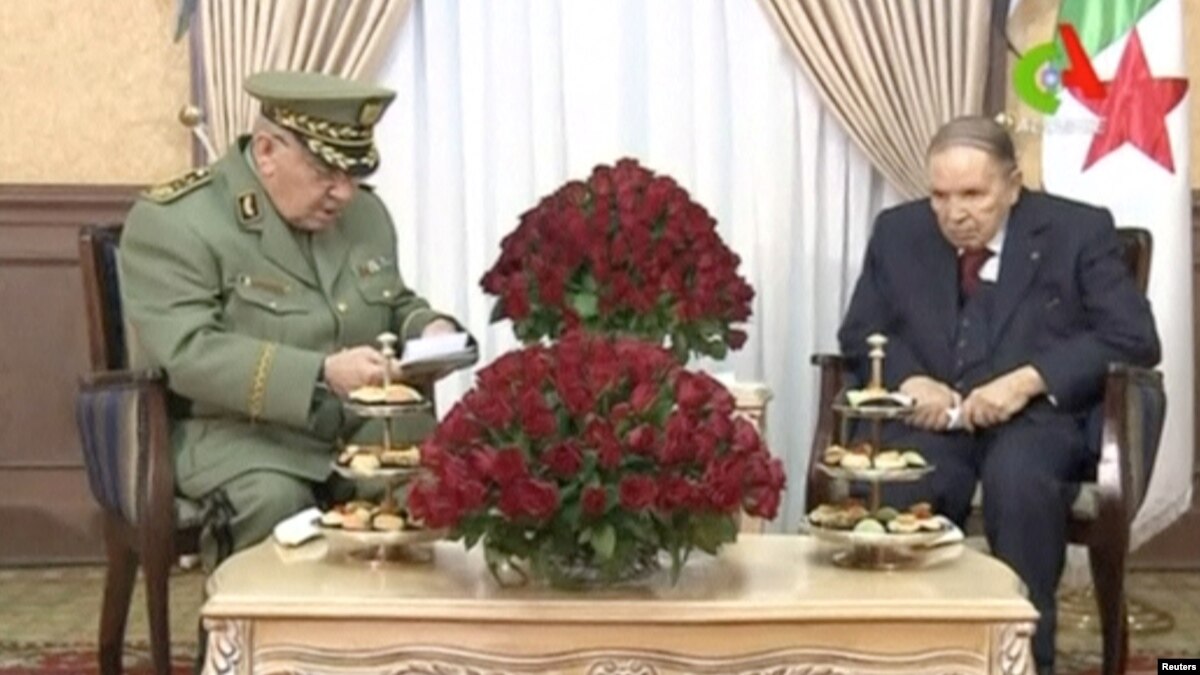
Algeria's powerful army chief wants to trigger the constitutional process that would declare ailing President Abdelaziz Bouteflika unfit for office.
After more a month of mass protests against Bouteflika's long rule, Army Chief of Staff Lieutenant General Ahmed Gaid Salah said Tuesday in remarks carried on Algerian television that the solution to the political crisis is to apply Article 102 of the Algerian Constitution.
Under that article, the Constitutional Council could determine that the president is too ill to fully exercise his functions, and ask the parliament to declare him unfit. The 82-year-old Bouteflika has barely been seen in public since a 2013 stroke.
The army chief is among the top power brokers in Algeria, and his announcement could pave the way for Bouteflika's ouster.
Back in Israel, PM Consults With Military on Gaza Violence
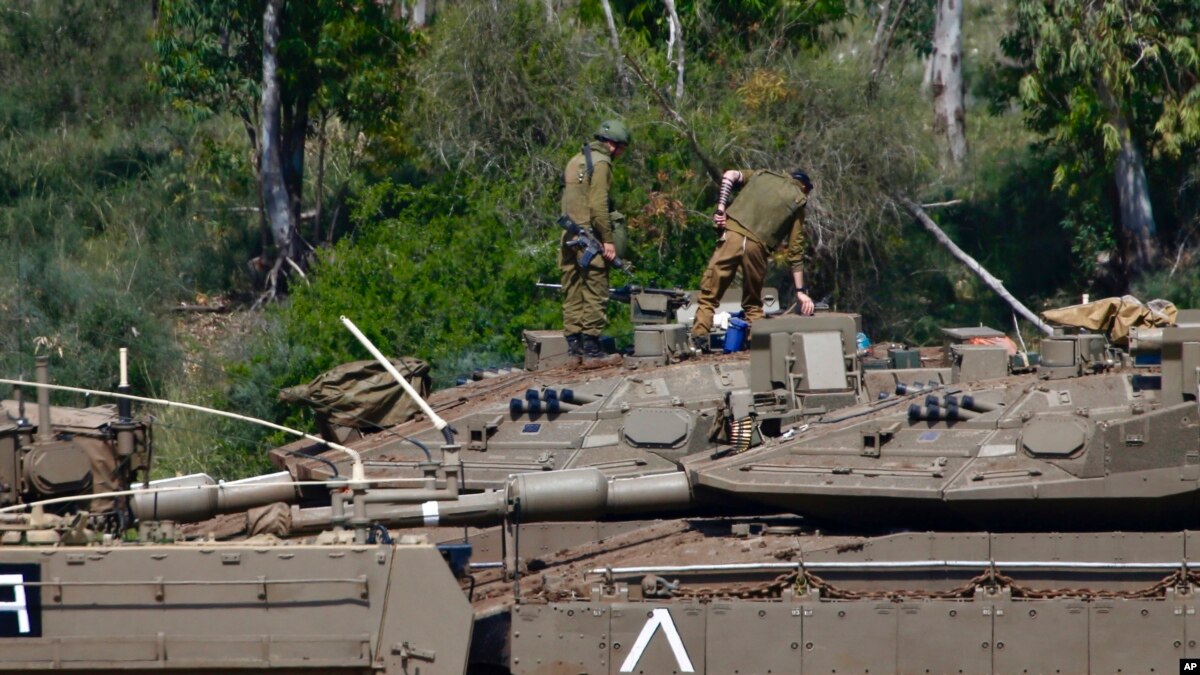
Israeli Prime Minister Benjamin Netanyahu returned home from Washington on Tuesday, heading straight into military consultations and vowing further action after a night of heavy fire in which Israeli aircraft bombed Gaza targets and Palestinian militants fired rockets into Israel.
Netanyahu rushed back to Israel to deal with the crisis after a meeting with President Donald Trump, canceling an address to the AIPAC pro-Israel lobby group and meetings with congressional leaders. Upon his return he told the AIPAC gathering via satellite that over the past 24 hours Israel had pounded militant sites in Gaza on a scale not seen since the 2014 war with Hamas.
“I can tell you, we are prepared to do a lot more,” he said. “We will do what is necessary to defend our people and to defend our state.”
Schools in southern Israel were cancelled Tuesday following the violence, which threatened to escalate into a major conflict just two weeks before the Israeli elections. The fighting subsided by morning, but the situation remained tense. Israeli troops massed on the Gaza frontier and imposed restrictions on public gatherings after dozens of rockets were fired toward communities in the area, including one that struck a house in the town of Sderot.
Overnight, the Israeli air force pounded militant sites of Gaza’s Hamas rulers and the smaller Islamic Jihad group. The targets included a multistory building in Gaza City that Israel said had served as a Hamas military intelligence headquarters and the office of Hamas leader Ismail Haniyeh. Gaza’s Health Ministry said seven Palestinians were wounded in the airstrikes.
Netanyahu faces the difficult task of delivering a tough blow to Hamas while avoiding protracted fighting that could work against him on election day.
He has come under heavy criticism from both allies and opponents for what they say has been an ineffective policy of containing Gaza militants, with calls demanding he deliver a devastating assault on Hamas, which is dedicated to Israel’s destruction. He has conducted indirect cease-fire talks through Egyptian mediators in recent months, and even allowed the delivery of millions of dollars of Qatari aid to Hamas to ease harsh conditions in the territory, which has been under an Israeli-Egyptian blockade since Hamas seized power in 2007.
After a meeting with Trump and before leaving Washington, Netanyahu indicated the election would not deter him from acting.
“Hamas needs to know that we will not hesitate to go in and take all necessary steps, regardless of anything, any date, other than Israel’s security needs,” he said.
The cross-border fighting was triggered by a surprise rocket fired early Monday from Gaza that slammed into a house in central Israel and wounded seven people.
The Israeli military said it was a locally-made rocket with a range of 120 kilometers (75 miles), making it one of the deepest strikes ever carried out by Hamas. The military mobilized two armor and infantry brigades and drafted some reserve forces before striking back at militant sites in Gaza.
Gaza’s Hamas rulers announced later in the day that Egyptian mediators had brokered a cease-fire, but the firing continued overnight before calm appeared to return early Tuesday.
The fighting set the stage for the most serious conflict since the 2014 war. But with no fatalities reported on either side yet, and the quiet holding for the moment, it seemed possible the two sides would step back from the brink once again.
Two weeks ago, rockets were fired from Gaza toward Israel’s densely populated commercial capital of Tel Aviv, and the Israeli military struck back hard, seemingly headed toward all-out-conflict. But Gaza’s Hamas leaders said the rocket fire was accidental and the fighting quickly subsided.
Israel and Hamas have fought three wars in the last decade. Although neither side appears to have an interest in another war, fighting could easily spin out of control. The 2014 conflict lasted 50 days and ended with over 2,000 Palestinian deaths, including hundreds of civilians, and 73 killed on the Israeli side.
In Gaza, Hamas is facing perhaps its toughest domestic test since seizing control of the coastal territory from the rival Palestinian Authority 12 years ago.
The blockade, combined with sanctions by the Palestinian Authority and mismanagement by the Hamas government, have all fueled an economic crisis that has left Gaza with an unemployment rate above 50 percent.
Hamas has been leading weekly protests along the Israeli border for the past year in hopes of easing the blockade, but the demonstrations, in which some 190 people have been killed by Israeli fire, have done little to improve conditions.
Last week, hundreds of Gazans protested the dire conditions, a rare expression of public discontent against Hamas, which responded with a violent crackdown, beating and arresting dozens of demonstrators and drawing rare public criticism.
By limiting its fire to border communities after Monday’s long-range launch, Hamas seems to be trying to keep the conflagration on low intensity. For Israelis living along the border who have suffered from years of rocket attacks that is little comfort.
“The Israeli government can’t, under no circumstances, settle,” said Haim Jellin, a Labor party candidate for parliament and a former head of the bordering Eshkol regional council. “Firing at Israeli communities that border with Gaza is the same as firing toward Tel Aviv, and it’s impossible we will show restraint at the continuous firing.”
Read More Back in Israel, PM Consults With Military on Gaza Violence : https://ift.tt/2uyS0eVSyrians Protest Trump's Decision on Golan Heights
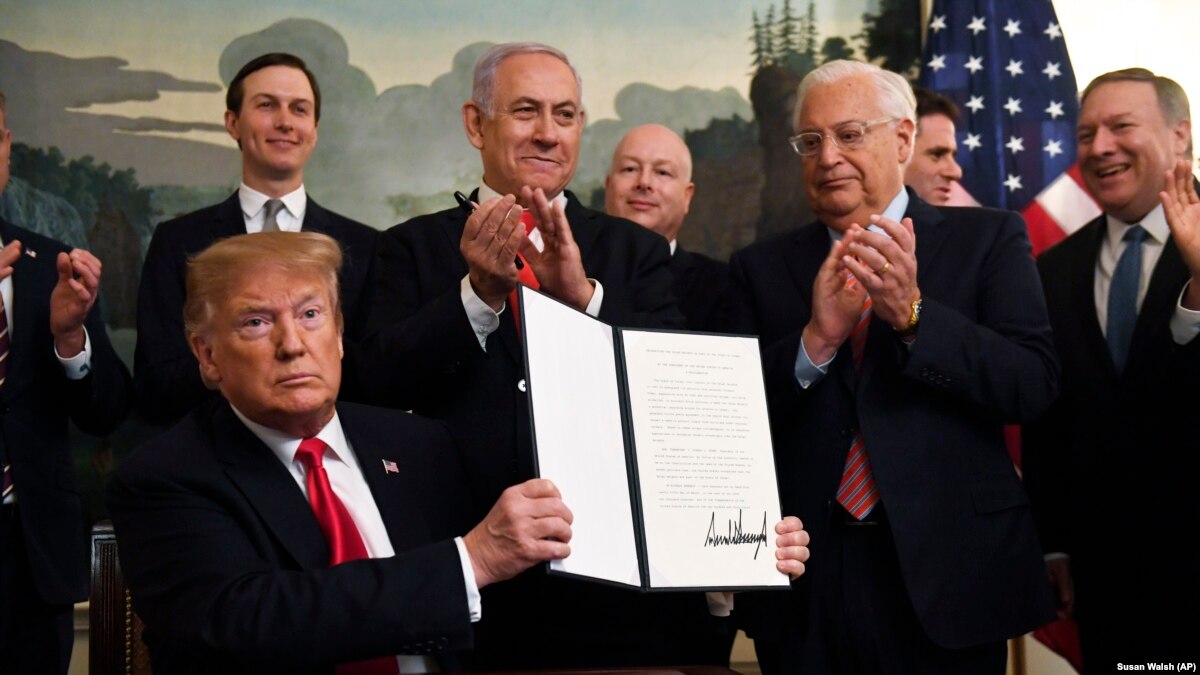
Syria's state news agency says thousands of Syrians have gathered in the streets of different cities to protest President Donald Trump's formal recognition of Israel's sovereignty over the occupied Golan Heights.
SANA posted photographs of a march in the southern city of Sweida on Tuesday morning, in which men and women carried Syrian and Palestinian flags and banners reading "Golan is Syrian."
SANA said another protest took place in the southern city of Daraa.
Trump formally signed the proclamation alongside Israeli Prime Minister Benjamin Netanyahu on Monday, reversing more than a half-century of U.S. policy in the Middle East.
The U.S. is the first country to recognize Israel's sovereignty over the Golan, which the rest of the international community regards as Israeli-occupied.
Monday, March 25, 2019
US Envoy: Fight Against Islamic State Militants Will Go On
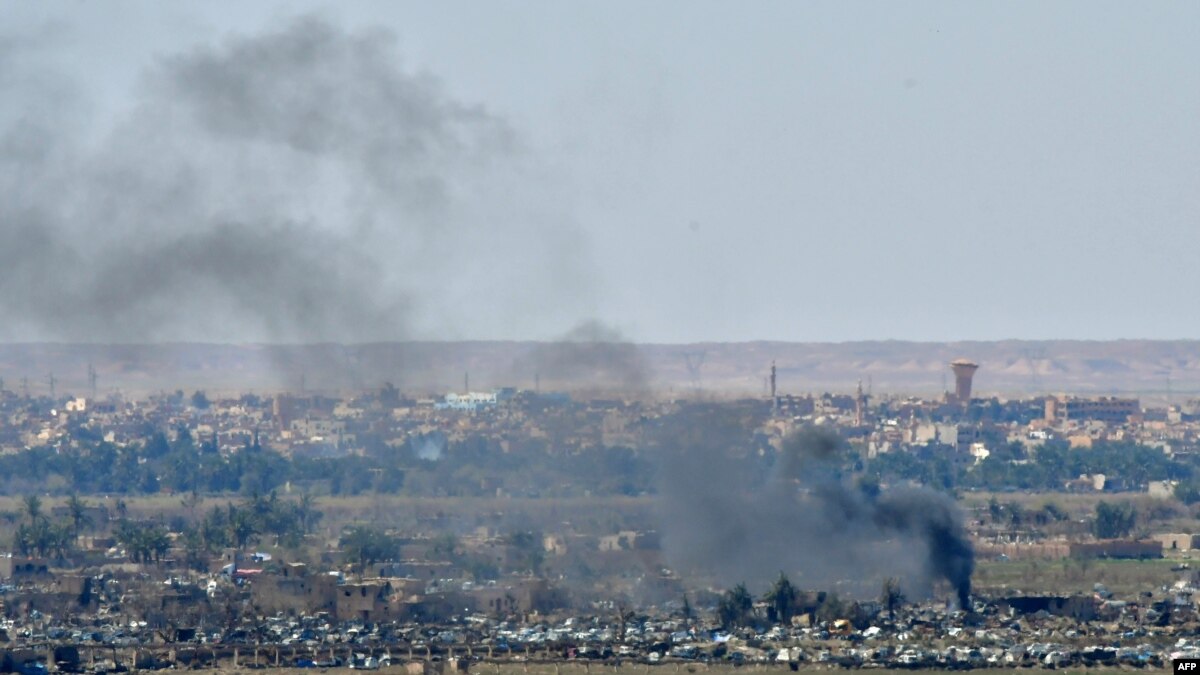
The U.S.-led coalition fight against Islamic State in Syria is not over, even though the group no longer controls territory, the chief U.S. diplomat for Syria warned on Monday and said the whereabouts of its leader Abu Bakr al-Baghdadi were unknown.
U.S. envoy for Syria, Jim Jeffrey, speaking to a briefing at the State Department, said Islamic State's loss of its last territorial stronghold in Syria over the weekend was a "great day" but the fight against the group will go on and U.S. forces would remain in Syria in limited numbers to help.
"This is not the end of the fight against ISIS. That will go on, but it will be a different kind of fight," Jeffrey told reporters. "ISIS has lost much of its capability to project terrorist power and to have a recruiting base in an area that it controls. So it's a very, very important development," he added.
Jeffrey said the focus of the coalition was on the enduring defeat of Islamic State and pressing governments to take back foreign fighters captured during the conflict.
He said most of the prisoners captured by the U.S.-based Syrian Democratic Forces (SDF) were Iraqis and Syrians. Those, he said, would be returned to their communities for "deradicalization," reintegration, and in some cases, punishment.
He dismissed reports that the U.S.-coalition was considering an international tribunal to try the prisoners. "We're not looking at that right now," he said.
It was difficult to estimate how many prisoners, including Iraqis, Syrian and foreign fighters, were being held by the SDF, he said.
"People are reporting to me we're in the 7,000 or more (range) but it may have gone up over the weekend," Jeffrey said.
Ahead of the final assault on Baghouz at the weekend, the SDF said it had 800 foreign fighters and more than 2,000 Islamic State wives and children.
Israel Candidate Gantz Says Willing to Use Force on Iran
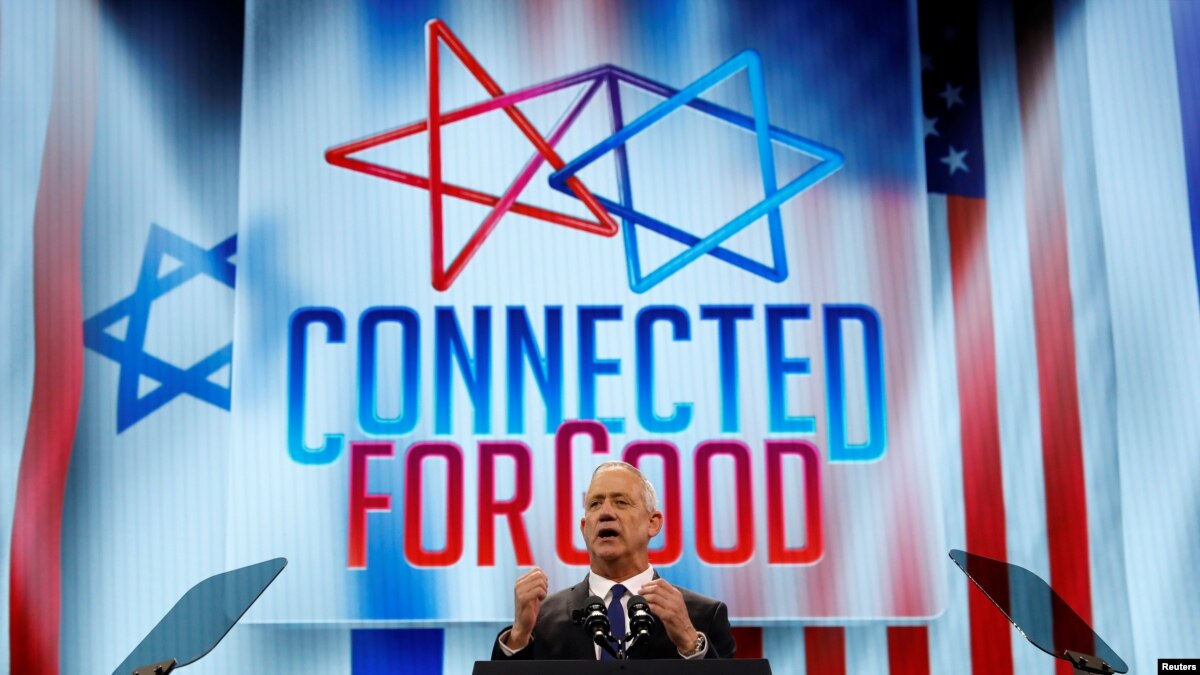
Benny Gantz, who is posing a stiff challenge to Israeli Prime Minister Benjamin Netanyahu in upcoming elections, said Monday he would not hesitate to use force on Iran to contain the regional rival.
In a speech to the US pro-Israel lobby AIPAC, Gantz also spelled out further his views on peace prospects with the Palestinians, insisting that Israel's military will always control security in the West Bank.
The centrist former military chief showed no daylight with Netanyahu on peace and security matters – but won standing ovations from the American Jewish audience by raising domestic issues, including promising more inclusiveness at the Western Wall in Jerusalem, Judaism's holiest site.
Citing his mother's experience as a Holocaust survivor and his son's service in the military, Gantz said that "strength and moral power come together."
"That is why I say from this stage to the Iranian regime -- never again. We will not allow you to establish yourself in Syria, we will not allow you to develop nuclear weapons," he said.
"On my watch, you will not become a regional power and I will not hesitate to use force if and when needed," he said.
Gantz said that Jerusalem – also claimed by the Palestinians – would always remain Israel's "united and eternal capital" and said, without ruling out a Palestinian state in the West Bank, that the Jordan Valley will "always" be Israel's eastern security border.
"Responsibility for the security of the land of Israel will remain in the hands of the IDF and the IDF alone," he said, referring to the Israel Defense Forces.
He said, however, that he was open to negotiations with the Arab world, amid Netanyahu's efforts to make peace with Gulf Arabs that oppose Iran.
"To those who would like to turn a new page, we will extend our hand in peace and we will strive for peace with any honest Arab leader," he said.
Lebanon PM Undergoes Heart Procedure in France
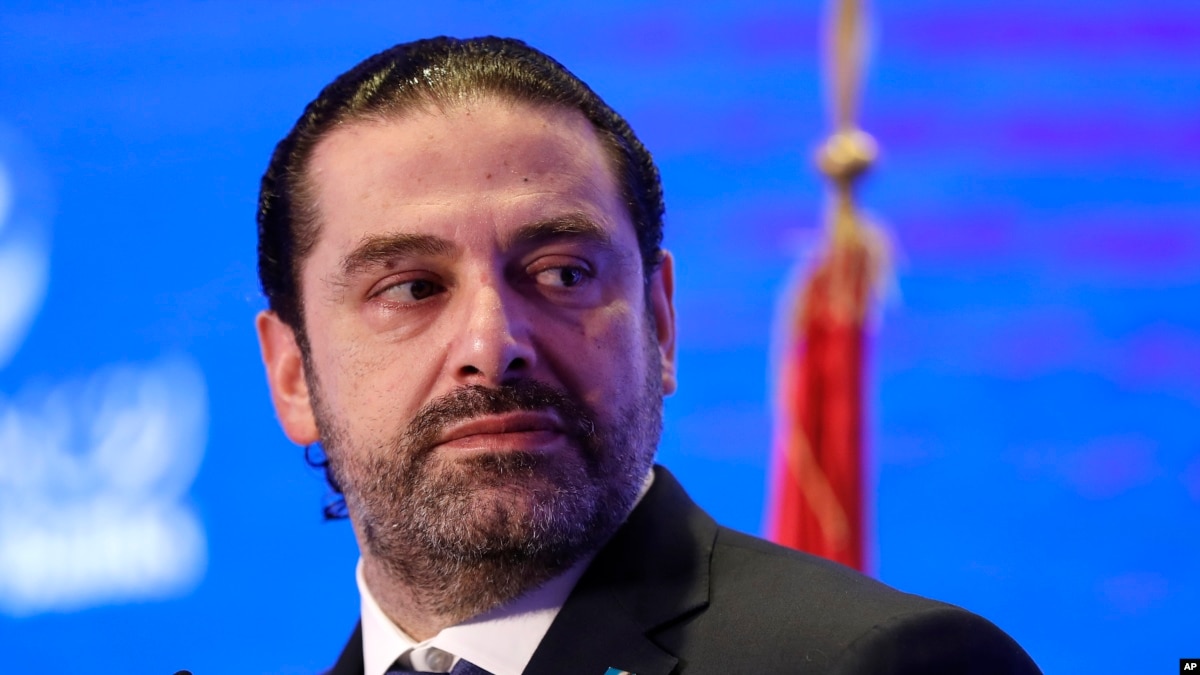
Lebanon's prime minister has had a heart procedure in a Paris hospital and is expected to be discharged the same day.
Saad Hariri's office says the 48-year-old underwent an hour-long angioplasty procedure, used to treat blocked arteries, on Monday. Hariri's personal physician, Essam Yassin, says the prime minister is well and describes the procedure as a "preventive" measure.
He says Hariri will return to his home in Paris later Monday.
Hariri is the youngest head of state in the region, and has been Lebanon's prime minister for three separate periods since 2009. He is now presiding over his third Cabinet, after being named premier again in February.
His father, Rafik Hariri, a business tycoon who also served as Lebanon's prime minister, was assassinated in 2005.
Syrian Group Wants International Tribunal for IS Detainees
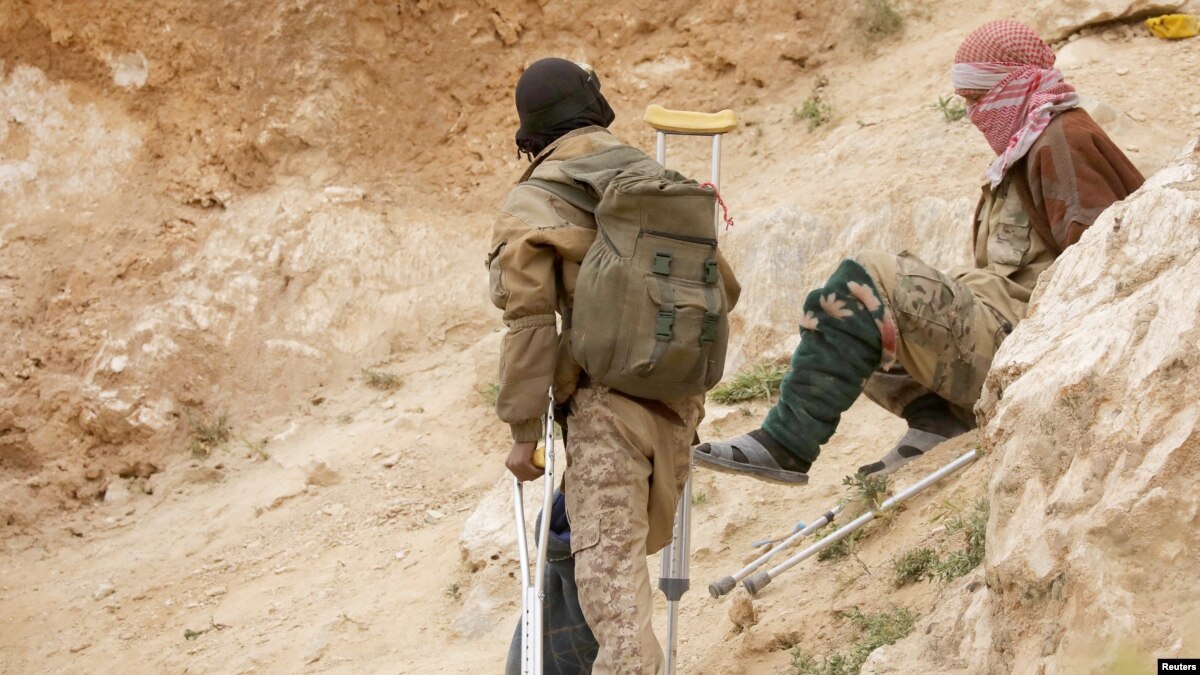
The U.S-backed Syrian fighters who drove the Islamic State group from its last strongholds are calling for an international tribunal to prosecute hundreds of foreigners rounded up in the nearly five-year campaign against the extremists.
The administration affiliated with the Kurdish-led Syrian Democratic Forces said Monday such a tribunal is needed "for justice to take its course," particularly after countries have refused to bring home their detained nationals.
The SDF has detained more than 1,000 foreign fighters, including many from Western countries.
The SDF has been fighting IS since 2014 and has retaken large areas in northern and eastern Syria. Its administration is not recognized internationally or by the Syrian government, which has vowed to bring all the country's territory back under its control.
UN Warns Of Spike in Cholera, Displacement in Yemen
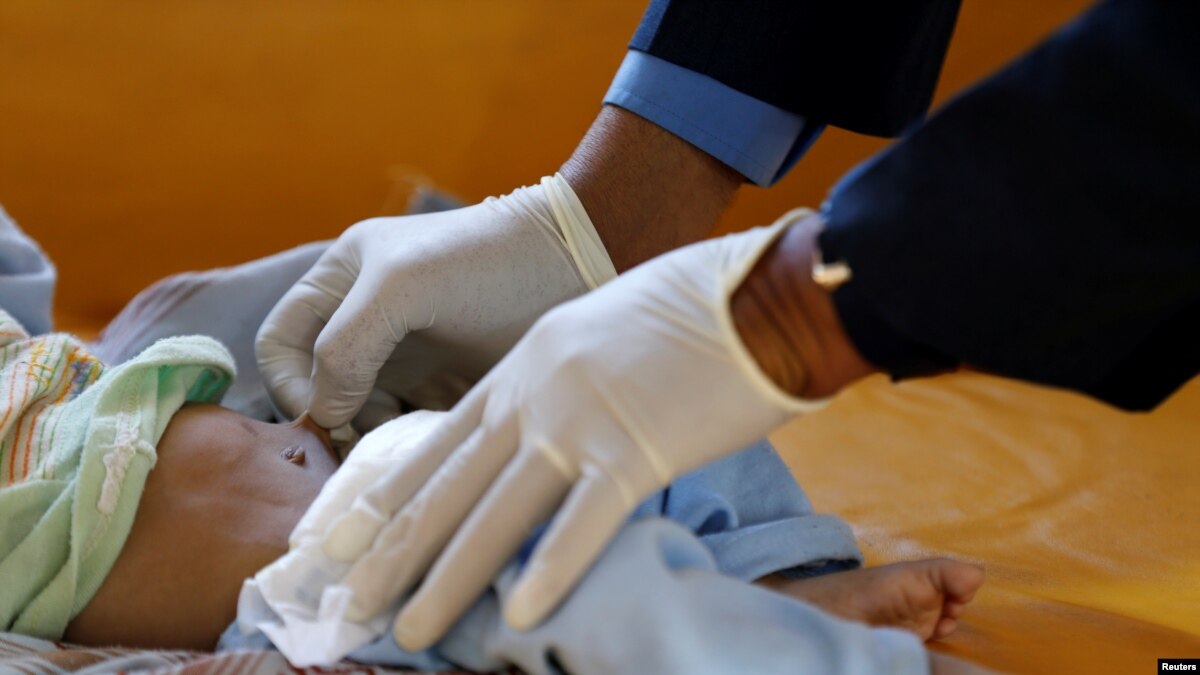
A United Nations humanitarian agency said on Monday that Yemen has witnessed a sharp spike in the number of suspected cholera cases this year, as well as increased displacement in a northern province.
The report from the U.N. Office for the Coordination of Humanitarian Affairs says 100,000 suspected cholera cases were found across Yemen from the beginning of the year until March, and over 190 people have died.
In the capital, Sanaa, the physician Saddam al-Azizi said last week's numbers exceeded 50 cases per day at al-Sabeen hospital, one of the largest in Yemen. He told The Associated Press that most of the cases were acute watery diarrhea, and 20 percent were confirmed cholera cases.
Yemen has witnessed two outbreaks of cholera and acute watery diarrhea since 2016, with over one million suspected cholera cases and some 3,000 deaths recorded nationwide. The U.N. agencies have deployed cholera vaccines to limited areas starting Mary 2018.
Cholera is caused by eating contaminated food or drinking water, and U.N. agencies have been working to support water, sanitation, hygiene and health facilities in Yemen. The aid agencies said that the epidemics are rooted in the country's collapsing health system after four years of conflict.
Spikes in cholera cases usually take place during rainy seasons in Yemen.
"It's mainly because of the rain, which sweeps the garbage and sewage, and it ends up in water wells," said al-Azizi. Wells are the main source of drinking water in many parts of Yemen.
Yemen's grueling civil war pits Houthi rebels — who control northern Yemen — against the Saudi-led coalition backing the internationally-recognized government. The war has forced the displacement of more than three million people and left most of the population food insecure.
In Monday's report, the U.N. also said more than 10,000 families had been newly displaced after fighting ravaged the northern province of Hajjah.
Thousands of people were caught in fierce clashes between warring factions in a district in Hajjah governorate called Kushar, a mountainous area only 50 kilometers (31 miles) from the border with Saudi Arabia. It has been isolated from the outside world — roads and all communication lines are cut after Yemen's Houthi rebels imposed tight control over Kushar this month after powerful local tribesmen took up arms against them in late January.
Egypt Refers 28 to Court on Charges of Joining IS, Al-Qaida
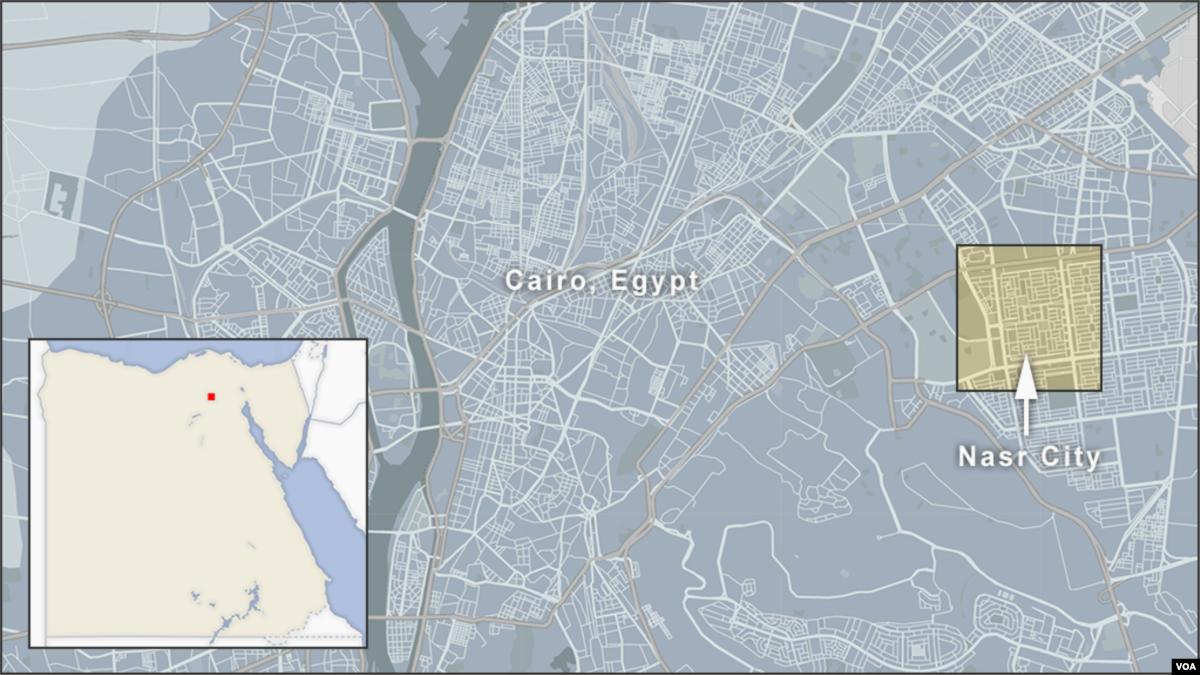
Egyptian prosecutors have referred 28 terror suspects in two separate cases to court on charges of joining local affiliates of the Islamic State group and al-Qaida.
They said Monday the suspects were plotting attacks against security forces and the headquarters of the high state prosecution in Cairo.
They say only 17 of the 28 suspects are in custody. No date has been set for their trials. It was not clear when or where they were arrested.
An IS affiliate based in northern Sinai has carried out attacks across Egypt in recent years, mainly targeting security forces and the country's Christian minority.
Egypt has been battling Islamic militants for years, but the insurgency gathered strength after the 2013 military overthrow of the country's first freely elected but divisive civilian president.
Flash Floods in Southern Iran Kill at Least 11, Injure 15
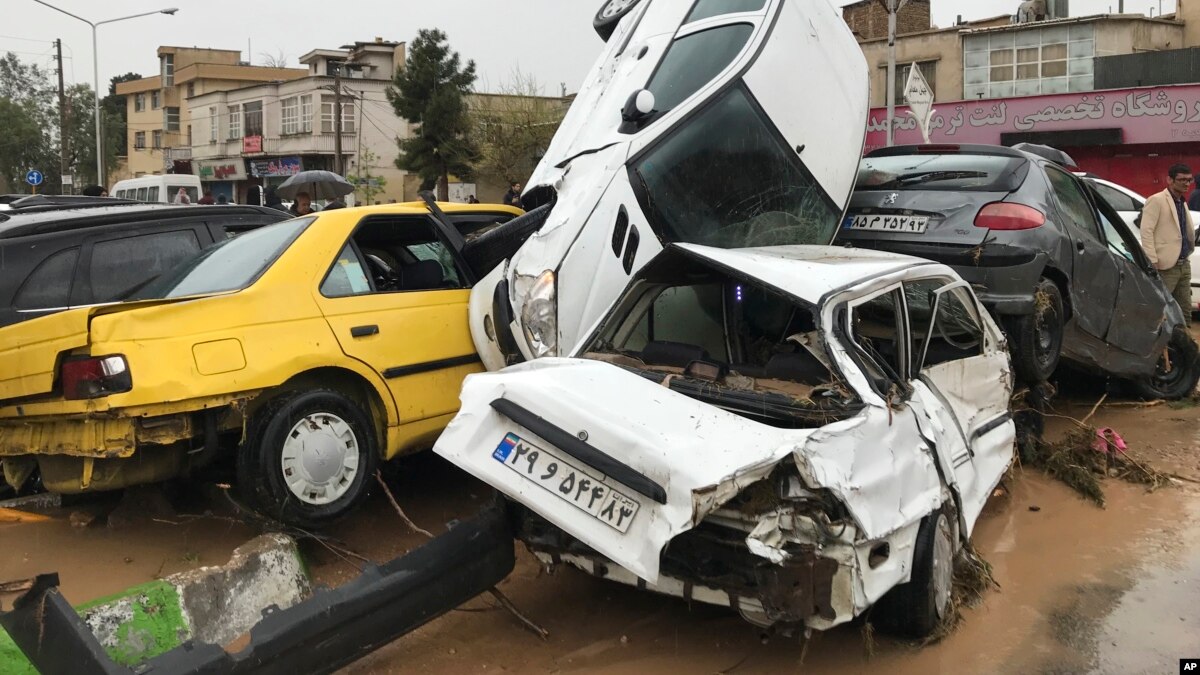
Iranian state TV is reporting that flash floods have killed at least 11 people and injured 15 in the country's south.
Monday's report quotes the head of Iran's emergency medical services, Pirhossein Koulivand, as saying the sudden flooding was triggered by heavy rains outside of the city of Shiraz.
State TV said the provinces of Fars, Kurdistan, Qom and Isfahan are also on alert for imminent flooding.
The northern provinces of Golestan and Mazandaran have been struggling with flooding for over a week, and two people have been killed.
Iran's metrology department had warned about the heavy rains in various areas across Iran.
Last year, at least 30 people were killed by flash floods in the Iranian province of Eastern Azerbaijan.
Libyan Oil Workers at El Sharara, Other Fields Demand Salary Increase
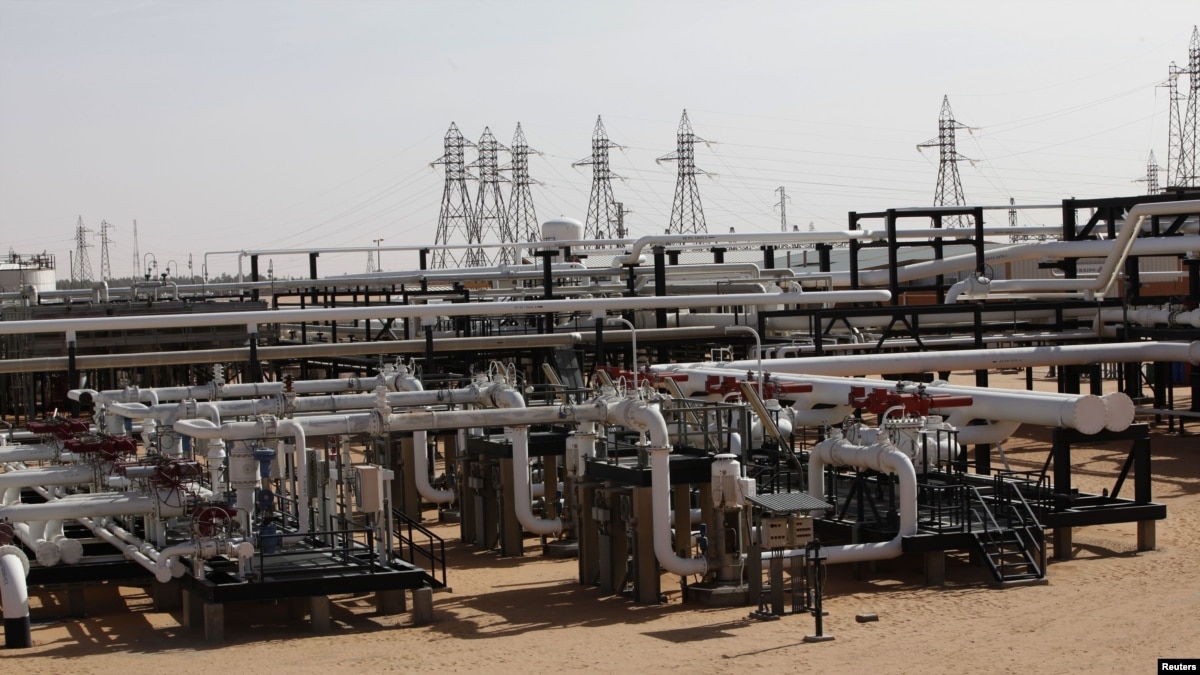
A number of workers at Libya's largest oilfield, El Sharara, and two other facilities are demanding a salary increase by two-thirds at a time when the OPEC country's oil output is surging.
The comments are the first sign of dissent at the 315,000-barrels-per-day (bpd) field in southern Libya since it reopened this month. State guards and tribesmen had closed El Sharara in December in an apparently successful attempt to clinch salary payments and development funds.
Workers at the National Oil Corporation, like other public-sector employees, have suffered because of a quasi-devaluation of the Libyan dinar, which has fueled inflation as Libya imports most of its food and other needs.
Some 50 to 60 workers at El Sharara, wearing blue jumpsuits, appeared in a video demanding a salary hike of 67 percent, a figure that the government decided in 2013. That planned pay rise was never implemented. Soon after the government settled on the amount, public finances took a hit from a series of oilfield blockades by armed groups and protesters.
Workers at two other fields also posted pictures that show them demanding a pay increase, calling their movement "Sabaa Wa Steen", the Arabic word for 67.
There has been no impact on oil production.
The El Sharara workers also complained about what they said was a three-month delay in salary payments and demanded the release of colleagues, including a foreigner, who were kidnapped by gunmen in July.
El Sharara, operated by NOC and foreign partners, has been pumping oil intermittently due to blockades mostly by armed groups and other incidents.
It is now controlled by the same state guards who had closed it in December, working with the Libyan National Army, which rivals the internationally recognized government based in Tripoli and took control of the south in a military campaign.
"We don't want anything except a salary increase. We work in the desert and are trying to increase production at El Sharara to its normal level," an engineer from the field told Reuters, asking not to be identified.
State oil firm NOC expressed support for the salary demand, saying its omission from the government's 2019 budget had come as a disappointment.
"The oil workers continue to perform their national duty, serving the interests of all Libyans in the most difficult circumstances," NOC Chairman Mustafa Sanalla said in a statement.
Libya's oil output has risen to 1.2 million bpd after the reopening of El Sharara, the Tripoli-based finance minister said last week. This is nearly the highest level since 2013. Whenever output hits 1 million bpd, salary demands tend to go up as NOC workers compare their earnings with those of employees at foreign firms who are paid in hard currency.
Most state institutions in Libya, particularly oil sites, have been subjected to repeated attacks and sabotage since the overthrow of Muammar Gadhafi in a NATO-backed uprising in 2011.
In June 2017, El Sharara workers went on strike over a lack of medical treatment for a colleague who died in a swimming pool accident.
Yemeni Children Victimized by 'World's Worst Humanitarian Crisis'
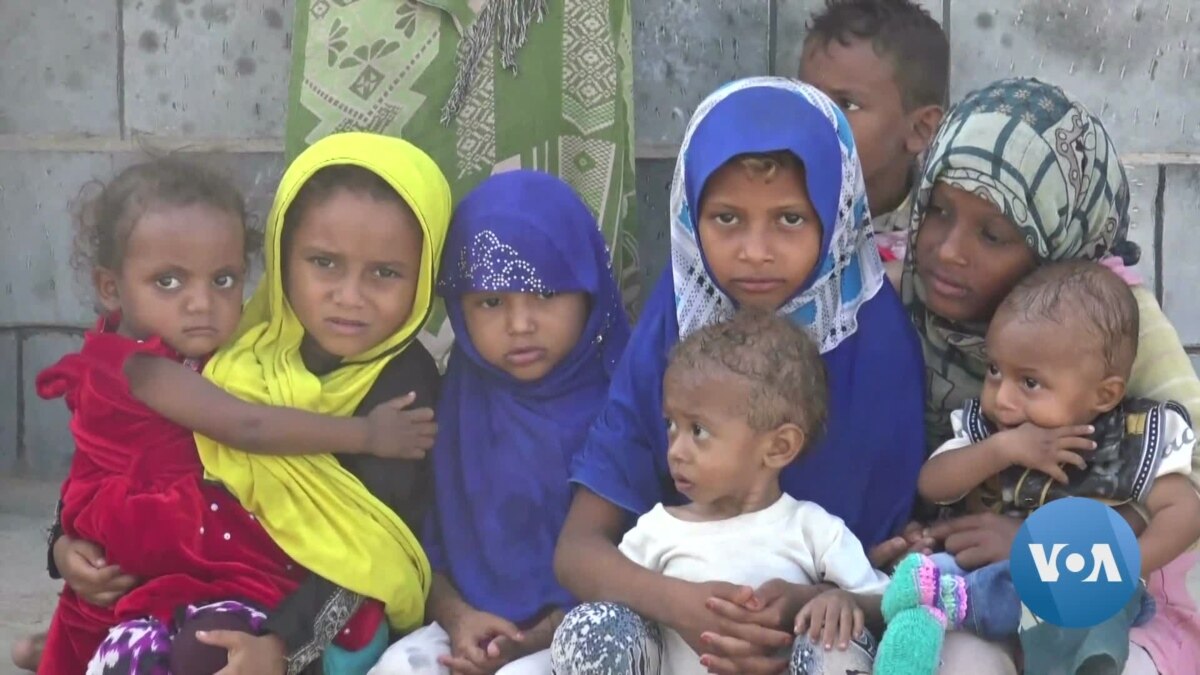
March 26 will mark the fourth anniversary of the Saudi-led coalition campaign to oust the Houthi rebels from parts of Yemen they had occupied. The fighting has caused what the UN calls "the world's worst humanitarian crisis," displacing people from their homes, creating food shortages, a growing civilian death toll and undermining children's development. The UN estimates that about 10 children die every day in Yemen from preventable diseases caused by hunger. VOA's Zlatica Hoke has this story.
Read More Yemeni Children Victimized by 'World's Worst Humanitarian Crisis' : https://ift.tt/2YkX3gPSunday, March 24, 2019
Israel Strikes Gaza After Border Bombs
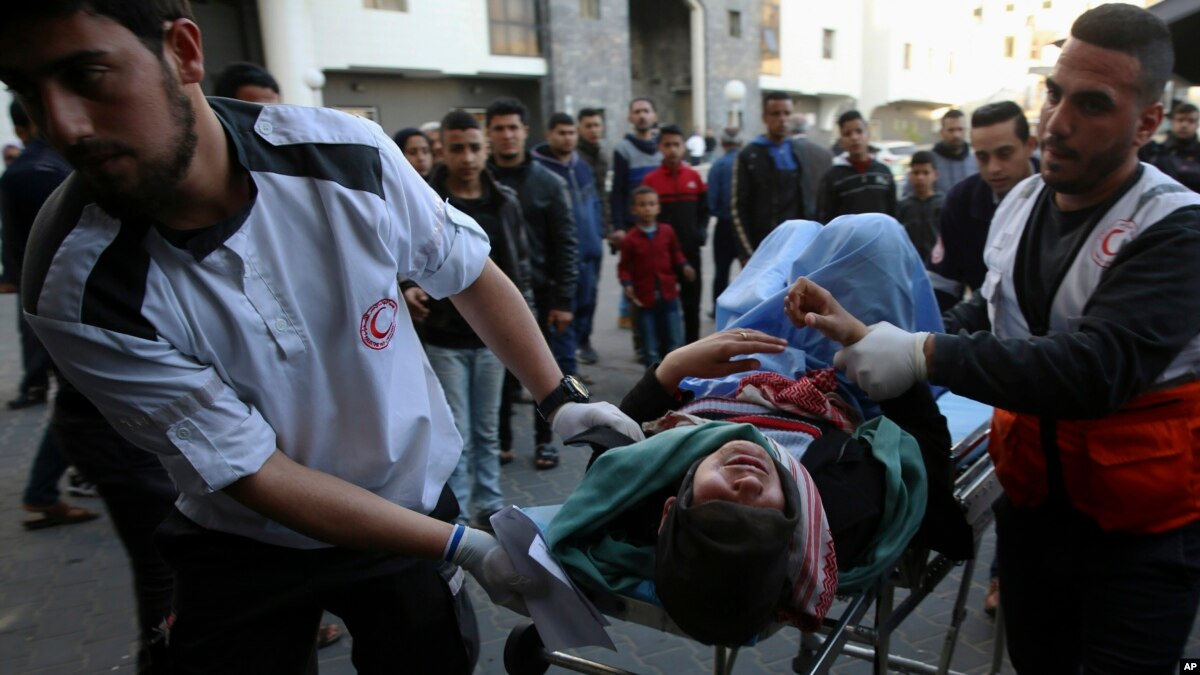
Israeli aircraft targeted Hamas positions in the Gaza Strip on Sunday after Palestinians there threw explosive devices at the border fence during "riots," the army said.
Also Sunday, the health ministry in Gaza announced the death of a Palestinian wounded previously in clashes with Israeli forces.
Palestinians in Gaza had thrown a number of explosive devices toward the border fence with Israel, one of which set off air raid sirens in the south of the country late Saturday, the army said.
"In response to multiple explosive devices that were hurled and exploded during Gaza riots near Israel's border fence this evening, an IDF aircraft targeted two Hamas observation posts in the southern Gaza Strip," a statement from the military read.
Later on Sunday, the army said a tank targeted a Hamas military position in the north of the enclave, after "balloons with explosives attached were launched from Gaza" and further explosive devices were thrown near the border.
One Palestinian was wounded in the strike, a medical source in Gaza said.
The Gaza health ministry separately announced the death of 24-year-old Habib al-Masri, who was wounded in clashes with the Israeli army. It gave no details on when he was wounded.
On Friday, two Palestinians were killed by Israeli fire in separate border clashes.
And on Saturday, the Israeli army launched two separate airstrikes against groups of Palestinians in Gaza who had allegedly flown balloons rigged with explosives into Israel.
The Gaza health ministry said two Palestinians had been wounded.
At least 258 Palestinians have been killed by Israeli fire in Gaza since weekly border protests began nearly a year ago.
Hamas leader Ismail Haniya is calling for a mass turnout for border protests scheduled for the first anniversary of the demonstrations, on March 30.
Israel holds Hamas responsible for all attacks from Gaza, controlled by the Islamist group since 2007.
Looking for Election Boost, Israel's Netanyahu in US to Meet with Trump
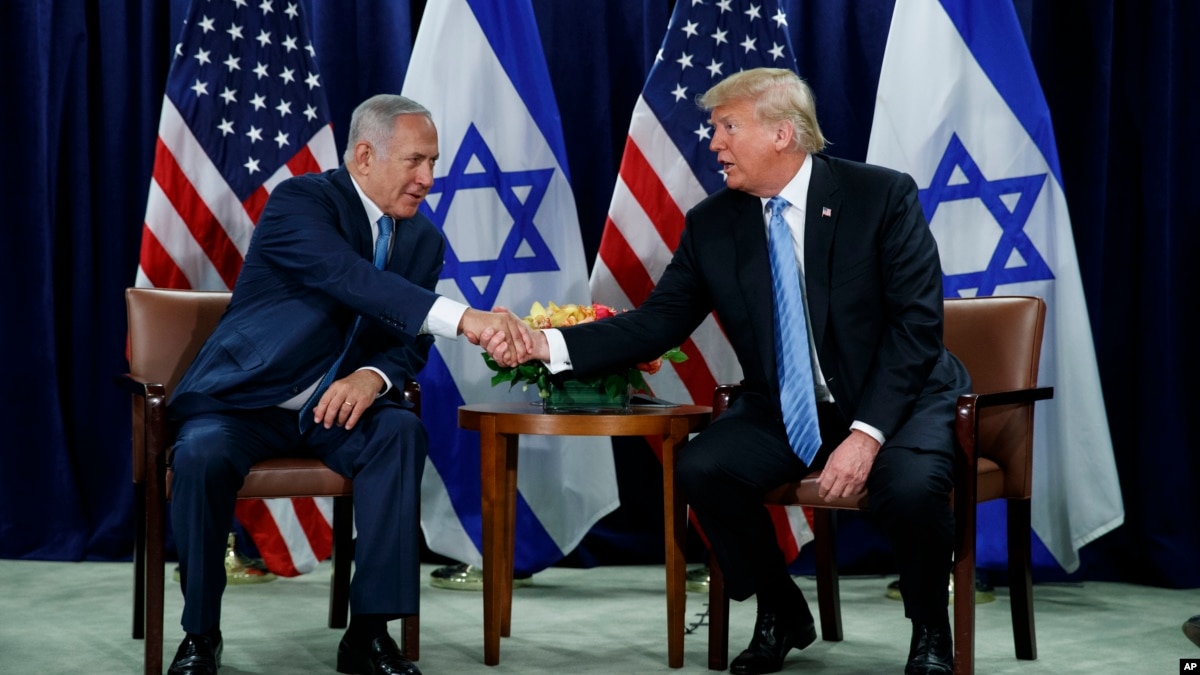
Israeli Prime Minister Benjamin Netanyahu arrived in Washington looking for an electoral advantage from U.S. President Donald Trump's expected formal recognition of Israeli sovereignty over the disputed Golan Heights.
Netanyahu, facing corruption charges and a tough re-election contest April 9, is meeting Monday with Trump at the White House and having dinner there on Tuesday, sandwiched around a speech to the American Israel Public Affairs Committee, a major U.S. lobbying group for the Jewish state.
Trump said on Twitter last week that he would recognize the Israeli ownership of the Golan Heights, the territory to the northeast of Israel along the Syrian border that was seized by Israel from Syria in the Six-Day War in 1967 and annexed in 1981.
Trump's stance breaks with long-standing U.S. policy and the international community, which considers the Golan Heights as Israeli-occupied, not a sovereign holding.
"President Trump will sign tomorrow in the presence of PM Netanyahu an order recognizing Israeli sovereignty over the Golan Heights," Foreign Minister Israel Katz wrote on Twitter on Sunday.
Netanyahu is lagging in political surveys ahead of next month's election. His main rival, former military chief Benny Gantz, is speaking at the annual AIPAC convention on Monday, but only Netanyahu will be at the White House dinner on Tuesday.
Trump compared his decision to recognize Israeli sovereignty over the Golan Heights as similar to that of his decision last year to recognize Jerusalem as the capital of Israel, another stance at odds with the international community. Israel claims Jerusalem as its eternal and indivisible capital, but the Palestinians have also staked a claim on Jerusalem as their capital in any eventual creation of a Palestinian state.
Netanyahu, in the run-up to the election, has stressed his friendship with Trump.
"Our alliance in recent years has never been stronger," the Israeli leader said last week as he met in Jerusalem with U.S. Secretary of State Mike Pompeo. "It is an unbreakable bond. It is based on shared values of liberty and democracy and shared interest to fight the enemies of democracy, the enemies of our way of life, the terrorists that prowl our airspace and our countries, and working together we have been able to achieve an enormous amount."
Trump's Golan Heights announcement came shortly after Pompeo visited the Western Wall, one of Judaism's holiest sites in Palestinian east Jerusalem, with Netanyahu, the first time such a high-ranking U.S. official had visited the site with an Israeli leader.
Moroccan Teachers Stage New Demo Over Benefits
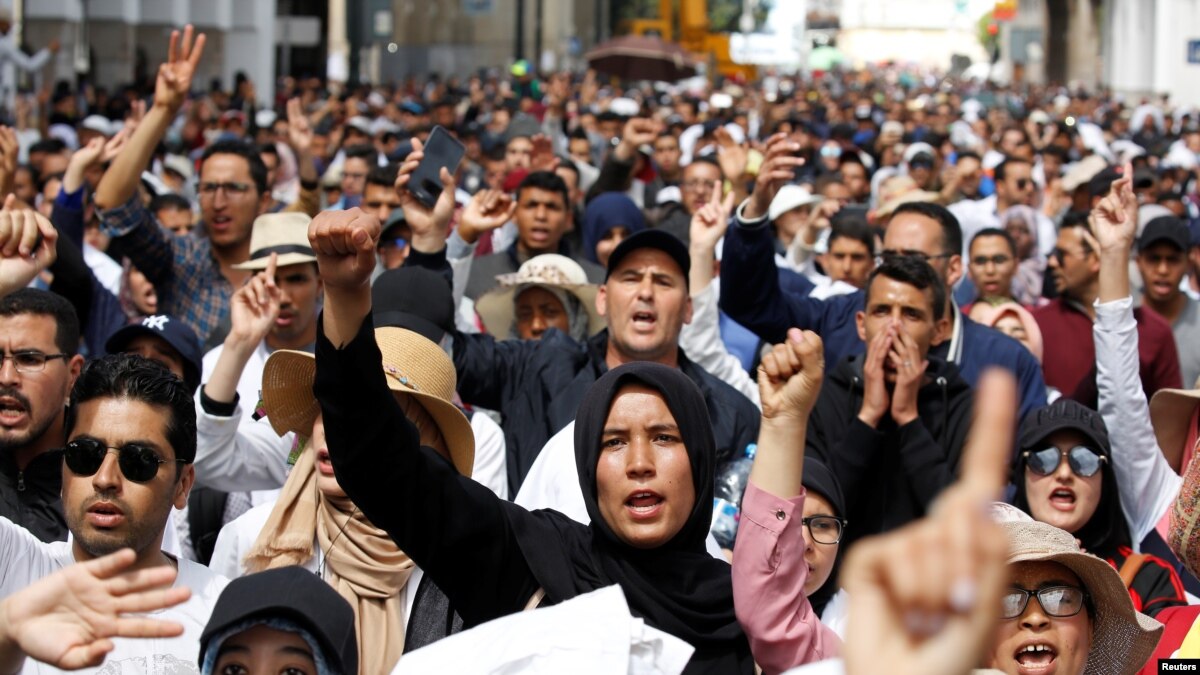
Thousands of teachers flooded the streets of the Moroccan capital on Sunday to demand better conditions after a nighttime protest dispersed by riot police left dozens wounded.
Teachers on temporary contracts have been on strike since March 3 demanding permanent employment arrangements that would improve their rights and benefits, especially over retirement.
On Saturday night baton-wielding riot police used water cannons to disperse a protest by several thousand young teachers who marched peacefully in central Rabat chanting "freedom, dignity, social justice."
As night fell, demonstrators held aloft candles and used their mobile phones as torches, before setting up a makeshift camp in front of parliament.
Police moved in to break up the gathering after the protestors refused to leave following more than two hours of negotiations, according to an AFP journalist.
Around 60 people were lightly wounded and taken to hospital, according to Othman Zeriouch, one of the organizers of the protest movement.
On Sunday morning several thousand teachers were back on the streets of Rabat, chanting slogans such as "we must safeguard free education" and "teaching is not a commodity."
They also demanded changes to current temporary contracts — saying "the people want [their] abolition" — in the protest which lasted several hours and followed a march to parliament.
Zeriouch said a meeting would be held later Sunday to discuss future action.
Teachers on temporary contracts enjoy the same salaries as their permanent colleagues — 5,000 dirhams ($520) a month — but unlike them do not have access to a pension fund and other benefits.
Iraq Parliament Sacks Governor Over Deadly Ferry Capsize
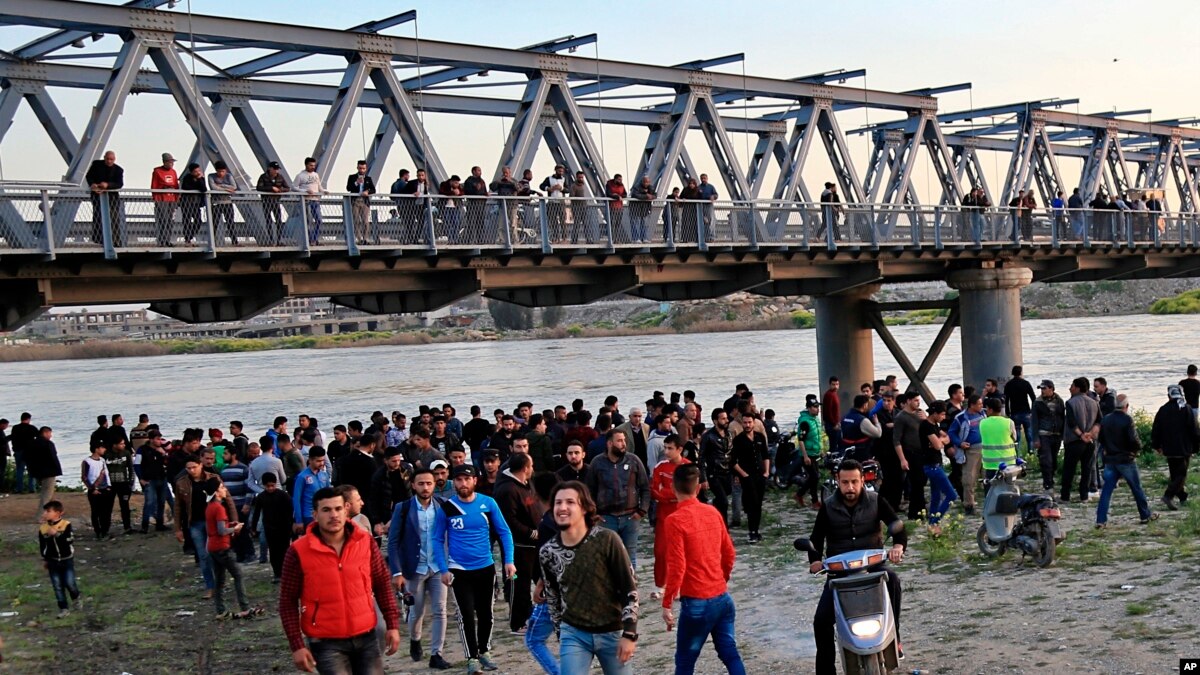
Iraq's parliament on Sunday sacked the governor of a northern province where 100 people died in a ferry disaster that sparked a wave of grief and anger.
Most of those killed when the boat sank Thursday in the Tigris River in Mosul were women and children headed for a Mother's Day picnic on the Kurds' Nowruz New Year holiday.
Prime Minister Adel Abdel Mehdi wrote to parliament on Saturday calling on legislators to fire Nineveh provincial governor Nawfel Akoub, citing "negligence and concrete failings" meriting his dismissal.
His two deputies were also fired during a vote in the national assembly.
Parliament declared those killed in the tragedy "martyrs", allowing their families to receive financial compensation and paving the way for court proceedings.
Sixteen people have been arrested as part of an investigation into the ferry capsize, a security official said.
Authorities say 63 people are still listed as missing.
Dozens of students held a silent protest Sunday on the campus of the university of Mosul, dressed in black to mourn the victims.
One of them, Abdullah al-Jubburi, told AFP they were demonstrating to demand that "corrupt" politicians and civil servants be replaced.
"The governor and all corrupt officials must be put on trial... We are fed up of being mistreated and marginalised," said fellow protester Isra Mohammed.
Akoub has already been subjected to the anger of victims' relatives and their supporters over alleged corruption and cronyism.
When he visited the scene of the tragedy on Friday stones were thrown at his convoy by protesters demonstrating against perceived corruption and neglect.
Saturday, March 23, 2019
Islamic State Defeated, Syrian Force Says
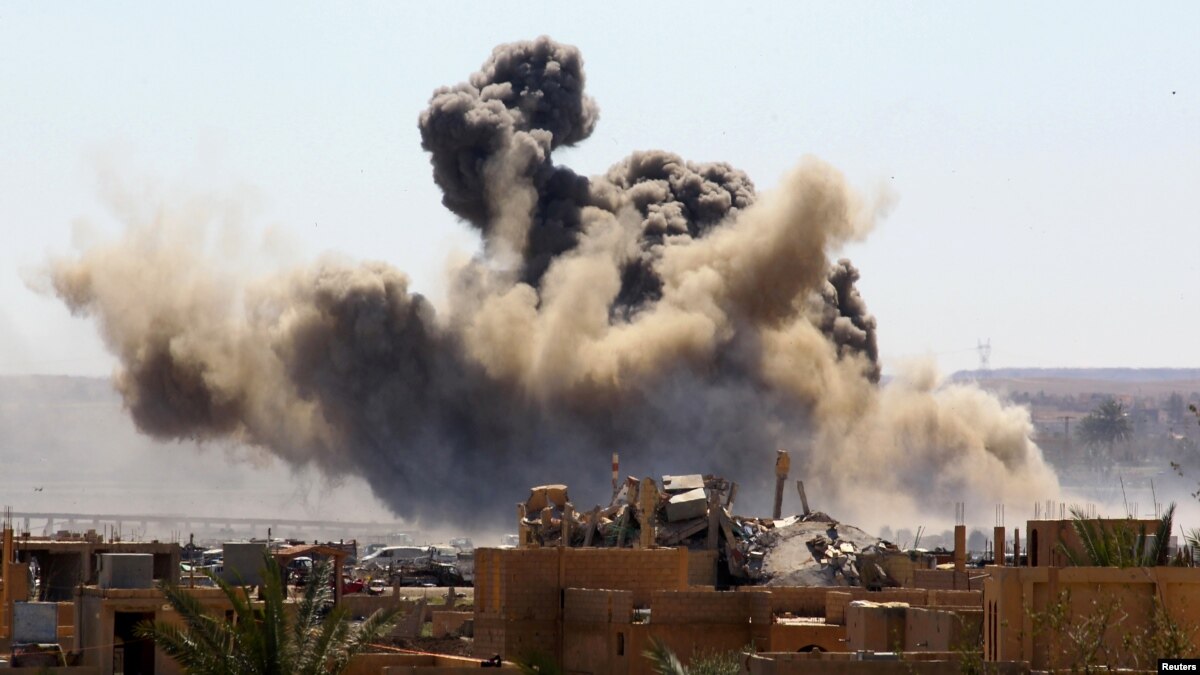
U.S.-backed Syrian force said Saturday it has liberated the last bastion of the Islamic State in Syria.
A spokesman for the Syrian Democratic Forces, Mustafa Bali, tweeted that “Baghouz is free and the military victory against Daesh has been achieved,” referring to the group by its Arabic acronym.
The SDF pledged to continue the fight against remnants of the terror group.
At its height in 2014, IS ruled over large swaths of Syria and Iraq, boasting dual capitals in Raqqa, Syria, and Mosul, Iraq.
Since then, the U.S.-led international coalition, along with partners on the ground, have rolled back the terror group’s hold.
Last scraps of land
The last territory under IS control, a couple of scraps of land in the northeastern Syrian town of Baghuz, began to slip through the terror group’s grip for good late Thursday into early Friday, after the U.S.-led coalition launched a new wave of airstrikes targeting the remaining IS-held positions.
Both SDF and coalition officials have also been wary that unknown numbers of IS fighters could still be lurking in trenches and in a complex system of caves and tunnels.
The tunnels, which are thought to run for at least two kilometers, helped hide tens of thousands of IS fighters and their families through much of the early part of the SDF offensive. And officials said there are indications certain tunnels may even extend into neighboring Iraq.
The London-based Syrian Observatory for Human Rights said just within the past day or so U.S.-backed forces encountered a group of more than 300 IS fighters in one of the caves and had to call in airpower.
Declaring victory
The SDF has been wary of declaring victory over IS in Baghuz, pointing to numerous predications of the terror group’s ultimate demise over the past several months that all proved to be premature.
But U.S. President Donald Trump has repeatedly predicted IS’ demise, telling reporters Wednesday the caliphate would be “gone by tonight” even though fighting persisted.
“For political reasons, he wants to declare victory,” said Heritage Foundation Middle East analyst Jim Phillips. “I think his statements are aimed at a domestic, American audience.”
As well as that message may be received by Trump’s supporters, however, there are deep-seated concerns that mistaking the collapse of the caliphate with the end of IS could be costly.
The biggest worry: upward of 60,000 people, including more than 5,000 IS fighters, who have surrendered or been captured since the SDF and coalition launched their final assault last month.
“These folks are unrepentant,” the official said. “The seeds for a future caliphate or certainly a persistent clandestine insurgency exist in these large numbers of people who ... are looking to reposition for future perpetuation of ISIS in some form or fashion.”
U.S. officials also warn that most of the group’s senior leadership, including self-declared caliph, Abu Bakr al-Baghdadi, remain at large, commanding at minimum “tens of thousands” of fighters and supporters across Syria and Iraq.
And even in the face of imminent defeat, IS’ true believers remain defiant.
“Those who are bewildered and think that our caliphate is over ... we will say that it’s remaining and expanding,” a fighter from Baghuz, identifying himself as Abu al-Harith al-Ansari, said in a video released Thursday and translated by the SITE Intelligence Group.
“The banner has been elevated, and the Ummah, whose sons are racing to martyrdom, does not know defeat,” he said.
VOA's Fern Robinson, Patsy Widakuswara and VOA Kurdish Service contributed to this report.
Read More Islamic State Defeated, Syrian Force Says : https://ift.tt/2TsbGLwFriday, March 22, 2019
IS Defeated, Caliphate Gone, US-Backed SDF Says
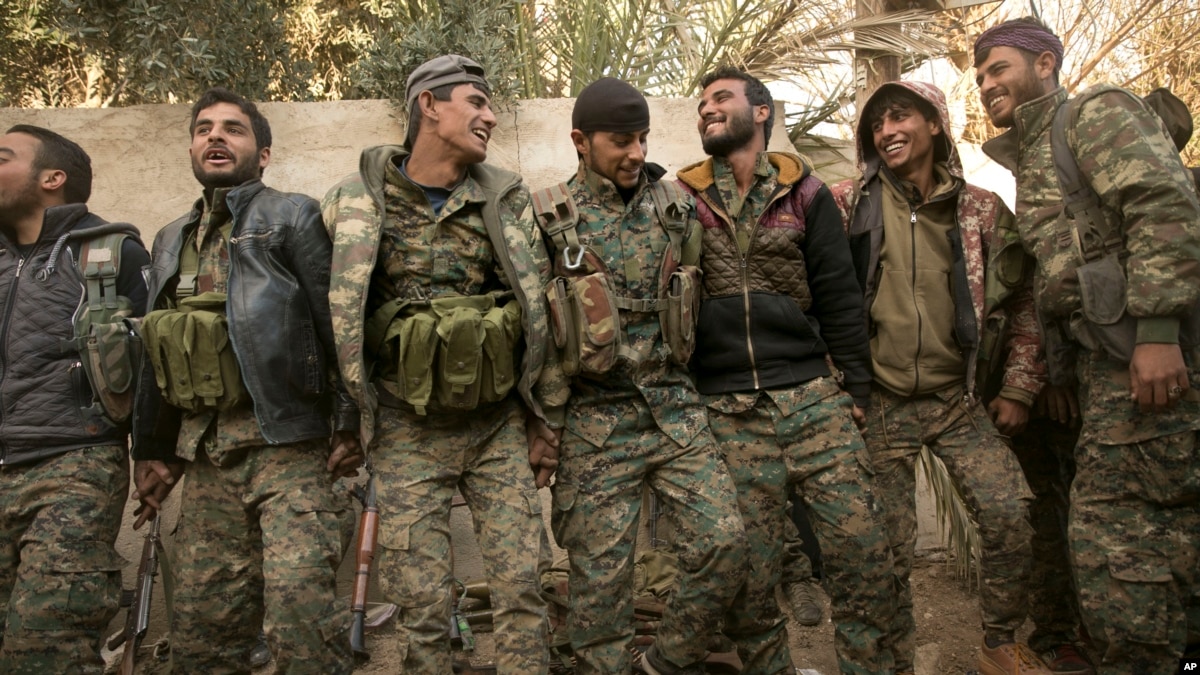
A U.S.-backed Syrian force said Saturday that it has liberated the last area held by the Islamic State group in the eastern Syrian village of Baghuz, declaring victory over the extremists and the end of their self-declared caliphate.
Mustafa Bali, a spokesman for the Syrian Democratic Forces, tweeted that “Baghouz is free and the military victory against Daesh has been achieved,” referring to the group by its Arabic acronym.
Bali said the so-called caliphate, which once sprawled across much of Syria and neighboring Iraq, is gone, and pledged to continue the fight against remnants of the extremist group until they are completely eradicated.
The announcement marks the end of a 4½-year campaign by an array of forces against the extremist group, which at its height in 2014 ruled an area the size of the United Kingdom, including several major cities and towns.
The group no longer controls any territory in Syria or Iraq, but continues to carry out insurgent attacks in both countries. It also maintains affiliates in Egypt’s Sinai Peninsula, Afghanistan and elsewhere.
Hundreds of Thousands of Algerians Rally Against Bouteflika
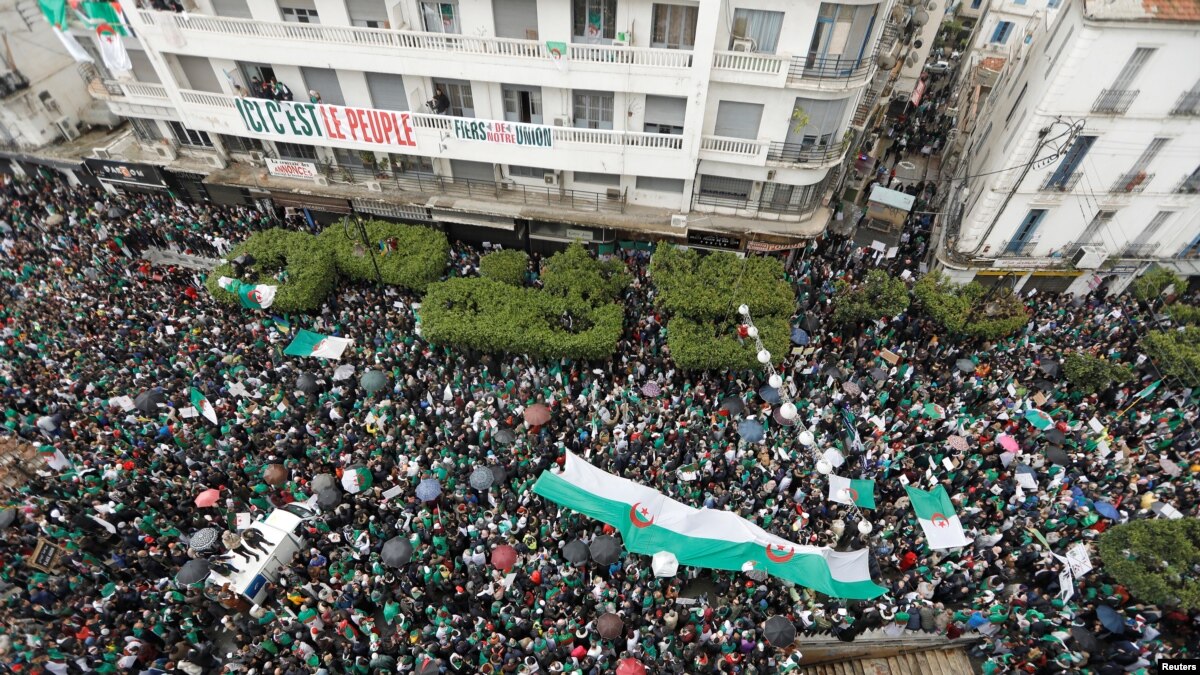
Hundreds of thousands of Algerians rallied on Friday to demand the immediate resignation of President Abdelaziz Bouteflika, who is fighting for his political survival in the face of relentless protests and the desertion of long-time allies.
In heavy rain, protesters brandished Algerian flags and pamphlets. Police trucks were deployed but there were no reports of clashes between security forces and crowds that packed downtown Algiers.
"We stay here until the whole system goes," said Mahmoud Timar, a 37-year old teacher.
Bouteflika, 82 and rarely seen in public since suffering a stroke five years ago, bowed to the protesters last week by reversing plans to stand in elections for a fifth term and promising reforms to make the political system more inclusive.
But he stopped short of quitting and said he would stay on until a new constitution is adopted, effectively extending his present term. The move further enraged Algerians, and many of Bouteflika's allies turned against him.
"We are close to victory. The system is divided," said restaurant owner Rachid Zemmir, 55, at Friday's rally.
Army, ruling party back protesters
Bouteflika has a track record of consolidating power by outmaneuvering anyone seen as a threat. First elected president in 1999, he wrested power from the secretive military-based establishment known as "le pouvoir" [the power].
In 2015, Bouteflika sacked powerful intelligence chief Mohamed Mediene, dubbed "Algeria's God." Last year he dismissed about a dozen top military officers.
In the most significant development in a month of demonstrations, Chief of Staff Lieutenant General Ahmed Gaed Salah threw the army's weight behind the protesters on Wednesday, saying they had expressed "noble aims."
That was a major setback for Bouteflika, who bolstered his position over the years with the help of the army and oligarchs who funded his election campaigns.
"The people and the army are brothers," protesters chanted on Friday.
Soldiers have stayed in their barracks through the unrest. The generals have intervened in the past at momentous times, including canceling an election which Islamists were poised to win in 1992, triggering a civil war in which an estimated 200,000 people were killed.
Some members of the ruling National Liberation Front party, known by its French acronym FLN, have also sided with the protesters. But Algerians want to dismantle the entire moribund political system.
"FLN, go," protesters chanted.
In the past, Bouteflika and his inner circle of fellow veterans of the 1954-1962 war to end French colonial rule, FLN officials and the military skillfully managed crises.
Algerians complain that Bouteflika, who joined the struggle against France in the 1950s at the age of 19, is out of touch and living in the past.
Algeria is a major oil and gas producer, and when the "Arab Spring" revolts toppled autocrats in neighboring countries, Bouteflika used oil revenues to secure loyalty.
Algerians with dark memories of the civil war in the 1990s set aside the same frustrations that triggered revolts elsewhere, giving Bouteflika breathing space.
But the price of crude oil has dropped over the years and the young are desperate for jobs, and an end to nepotism.
Bouteflika said in a speech in 2012 that it was time for his generation to hand over to new leaders. Many Algerians believe his brother Said is now effectively running the show.
Even if Bouteflika quits, it is not clear if the swelling protest movement can take on the secretive network of ruling party leaders, business tycoons and army generals long regarded as omnipotent.
These figures may be happy to see Bouteflika go but are likely to resist any major changes, as they have done before.
Read More Hundreds of Thousands of Algerians Rally Against Bouteflika : https://ift.tt/2Fv4KcYSearch
Featured Post
Tornado Watch for parts of Middle Georgia - wgxa.tv
[unable to retrieve full-text content] Tornado Watch for parts of Middle Georgia wgxa.tv "middle" - Google News December 30...
Postingan Populer
-
[unable to retrieve full-text content] Monroe County Middle School goes virtual next week due to COVID-19 exposure wgxa.tv "middl...
-
Members of the Meany Middle School PTSA are calling on Mayor Jenny Durkan , Seattle Parks , and City of Seattle officials to give a group...
-
The global demand for palm oil is driving the fires in Indonesia Quartz Palm oil is in your infant formula, chips, and shampoo. Develope...